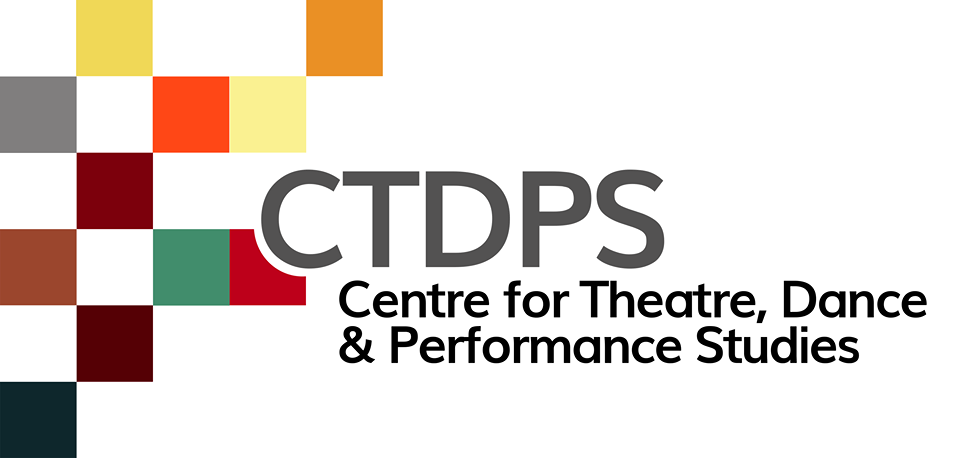PRODUCTIONS
2023
-
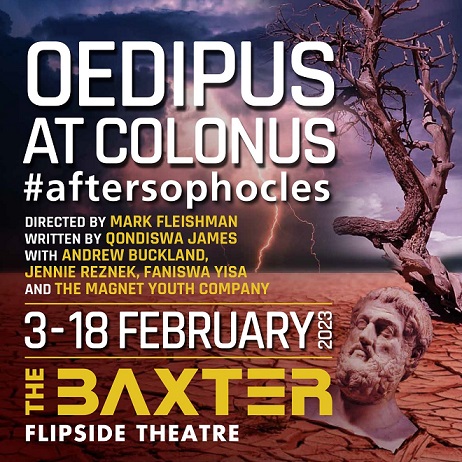
Oedipus at Colonus: #aftersophocles
This is a play about time, aging, and dying. It was written by Sophocles at the end of his life when he was an old man facing his own death. It is the third play in the so-called Theban cycle, the first being Oedipus Rex, the second being Antigone and this being the third. However, in terms of the chronology of the Theban narrative, the action of the play precedes the action of Antigone. It is also a play about the land and belonging to the land, or more precisely, a desperate desire to belong to the land. In this way the play, written in the 5th century BC, has immense relevance for our contemporary postcolonial, post-apartheid context in which issues of land hunger, of dispossession, of occupations and removals, continue to plague our society so many years after the advent of democracy. It is also a play about the limits of redemption and forgiveness. It poses a question as to whether the wrongs of the past can ever really be forgiven. Is there a possibility for penance? Is Oedipus’ tearing out of his eyes enough? At one point in the play the chorus pronounce: “There may be healing of past wrongs but no undoing them”. Can the polluted figure from the past ever be accepted in the present and what are the consequences of the polluted body being inserted into the land after death? Consequences for the land and for the people who live on that land. Sophocles text is translated by Oliver Taplin, with permission of Oxford University Press. -
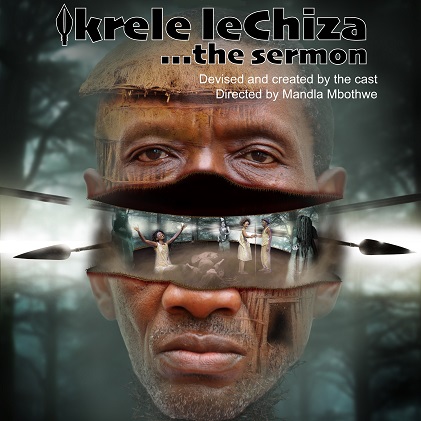
iKrele leChiza 2023
A revisiting and reinvestigation of iKrele leChiza (2020/2021) for the stage. This is the fourth iteration in the development of this production. The first iteration was severely impacted by the Covid pandemic, and resulted in the pivot towards the second iteration in the form of an audio sonic journey and an episodic video collection as an output of the rehearsal process. For this third iteration, the production is being envisioned to finally be presented on stage to a live audience, and includes a larger chorus comprising the Magnet Trainee cohort of 2022. iKrele leChiza [The Sword of the Herb]...the sermon, a production directed by Mandla Mbothwe comes to Magnet Theatre for a limited season. This profound new work tells the story of a family trapped in liminal spaces between life and death and is told by a stellar cast of contemporary artists and the next generation of SA performers in their final year on Magnet Theatre's full-time training and Job Creation Programme. UCT's CTDPS (Centre of Theatre Dance and Performing Studies) and Magnet Theatre's iKrele leChiza...the sermon is part of the ReTAGS project. A production of ritual, song and magic realism, it stirs up a dreamlike state of spiritual ecstasy much like a sermon. -

Ai
A Butoh-Ballet about the delicacy of love. Meaning love in Japanese, Ai is a Butoh-Ballet, a dance performance that speaks about the impossibility of love, and the finding of it in unusual spaces. Job joins forces with her long-time collaborator, the award-winning classical pianist, José Dias, whose talents are regularly seen with Cape Town Opera, and most recently, with Sandra Prinsloo in Masterclass. In Ai, job develops new strands to her signature solo style and dances with acclaimed French ballet dancer, Alexandre Bourdat. Their work together directly follows Bourdat’s performance season at the Royal Danish Theatre in Copenhagen. The tour de force of Ai, however, lies in the unusual duet between jackï job and a horse called Beauty. Within their meeting, the majestic and the mundane sensitively merges, and love is re-imagined. Ai is performed in the garden of the Irma Stern Museum. Surrounded by green, audiences can enjoy a dance with animal and human natures. -
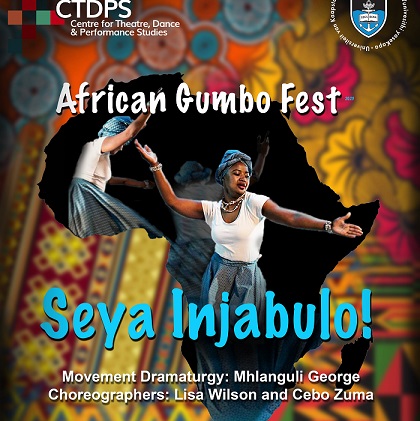
African Gumbo 2023
2022
-

iKrele leChiza 2022
A revisiting and reinvestigation of iKrele leChiza (2020/2021) for the stage. This is the third iteration in the development of this production. The first iteration was severely impacted by the Covid pandemic, and resulted in the pivot towards the second iteration in the form of an audio sonic journey and an episodic video collection as an output of the rehearsal process. For this third iteration, the production is being envisioned to finally be presented on stage to a live audience, and includes a larger chorus comprising the Magnet Trainee cohort of 2022. iKrele leChiza [The Sword of the Herb]...the sermon, a production directed by Mandla Mbothwe comes to Magnet Theatre for a limited season. This profound new work tells the story of a family trapped in liminal spaces between life and death and is told by a stellar cast of contemporary artists and the next generation of SA performers in their final year on Magnet Theatre's full-time training and Job Creation Programme. UCT's CTDPS (Centre of Theatre Dance and Performing Studies) and Magnet Theatre's iKrele leChiza...the sermon is part of the ReTAGS project. A production of ritual, song and magic realism, it stirs up a dreamlike state of spiritual ecstasy much like a sermon. -

Unmasked
In 2022 Second Chance theatre Project, SA and Geese Theatre Company, UK collaborated on the Unmasked Project, funded by the British Council's International Collaboration Grants. Both theatre companies work in the criminal justice settings using theatre strategies to develop individual and collective social health. The Second Chance Theatre Project has been associated with the University of Cape Town since its inception, and has been funded by the National Research Foundation 2019 - 2021. The production of Unmasked made on the South African side, toured to prisons and youth community centres, Zabalaza mini-festival in Mitchell’s Plein and the Gangstar Café in Mowbray. It is an interactive performance, typical of applied theatre, in that the facilitators jump in and out of role using the masks for core emotions. Veronica Baxter is the Research Lecturer on this project, as well as artistic director/researcher of Second Chance Theatre Project. -

35th Miner 2022
"35th Miner" is the aftermath of the Marikana massacre, a story that captures the life of a young girl called Nomalanga who lost her father during the Marikana massacre in South Africa, 16 August 2012. In many Black cultures in South Africa, Black people align themselves with dreams and connect with them as memories, guidance and revelations. Nomalanga dreams about her father but it is painful and traumatising when one dreams of a particular important family member that was violently killed. This theatrical dance piece deals with the post traumatic disorder experienced by families that are still mourning their loved ones through the lens of a young girl, Nomalanga. -
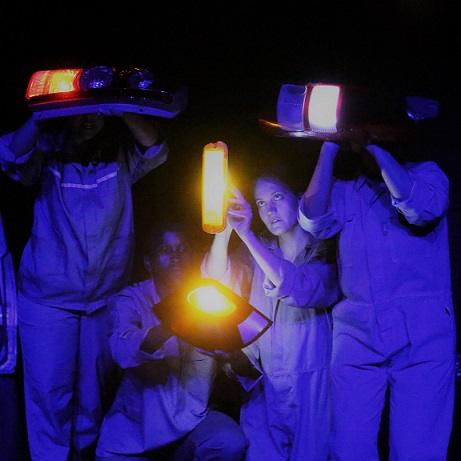
P3 Object Theatre 2022
These performances are part of the third years exam for the Object Theatre course. The Object Theatre performance is made in small groups (3 people per group) of approximately 10 minutes in length performed live at the end of the course with technical assistance. They are adapted from written short stories. The parameters and scope for this project are diverse. Material experimentation, object animation and practical making is encouraged. A demonstration of performance and theatre making skills in concert with the mobilization of materials and objects constitute the core of the project. Inspired by table top performances, it's recommend that each group limit the size of their playing space and that they think of doing that by making it an object or piece of furniture, that would give the ‘floor’ of the world they are trying to make and operate from. The course is facilitated by Jenni-lee Crewe, Jayne Batzofin and Iman Isaacs. -
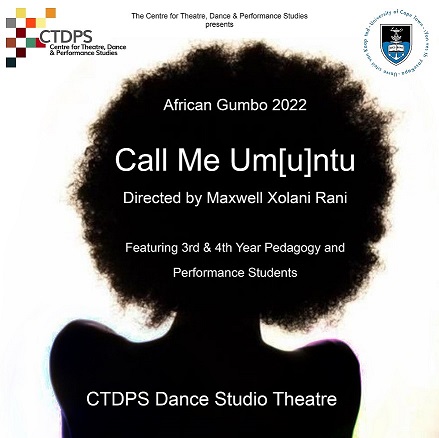
African Gumbo 2022
African Gumbo 2022: Call Me Um[u]ntu, at the CTDPS prides itself in celebrating Africa Month in the month of May as it is also sanctioned by UCT, the South African Government and the Organisation of African Unity (OAU). We make sure to commemorate what Africa has achieved since 1963 and the founding of the OAU. Our African Gumbo 2022 explores the notion of Um[u]ntu. What is it to be humane? What are the values in humanity today when hatred, disharmony and war is so pervasive? By exposing some of the social ills that are experienced by wom[a]n on our continent through theatrical pieces, we are aiming at creating a platform for rich conversation to combat such injustices through interrogating and sharing the complex dynamics of life and gender imbalances. The processes of movement investigation in African Contemporary Dance have proven to be a healing source for most of the CTDPS students and choreographers in this cast. I am very grateful to all the participants on and off stage. Thank you. We are hoping to touch some audience members by exposing the power invested in movement and Dance as a tool for wellness in ourselves, each other … in Africa and the world. -
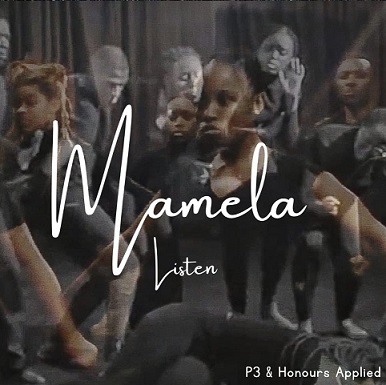
Reminiscence Theatre 2022
This year's Reminiscence Theatre project, entitled 'MAMELA/LISTEN' is a 20-minute video performance on the theme of reminiscence and memory. A group of senior students created a video performance based on their interviews with people over 60 years old, listening to their stories. They have also interpreted the verbatim interviews and the themes around ageing in a choreography. The task was that each student should interview a subject over 60, on their memories and how they perceive life now. They were then asked to perform this as a monologue, integrating choreographed movement to enhance the delivery. The final choreography was created in a collaborative process guided by Veronica Baxter, that improvised dance around key words developed through image theatre. This choreography was refined with Saranya Devan. Scenario development for the interviews were collaboratively created with Nawaal Adams and Savannah Steyn Carmeleea Pillay as Elaine Govender, Kwazulu-Natal Zandile Zihlangu as Nomahlubi Zihlangu, Western Cape Luvuyo Gishi as Khandiyeza Gishi, Western Cape Charty Luvuvamu as Sarafina Lukau, Western Cape Songezo Choice Mtshixa as Thyopo, Western Cape Sihle Thole as Fikile Ziwele, Western Cape Nalitye Shaninga as Monika Hamunyela, Namibia Sibahle Sibiya as Nonhlanhla Sibiya, KwaZulu-Natal The students are from the Applied Performance and Pedagogy stream at the CTDPS. This stream combines theatre and dance students in learning how to facilitate performance in and from various communities and schools. The principle underlying the Applied Performance and Pedagogy stream is that the work is collaborative. Please note: Each student edited their own piece. The educational intention was not just to complete the verbatim and choreographic tasks but also to learn how to edit media. -

Young Audiences Project 2022
The Young Audiences Project is designed to incubate a new theatre work that is devised, performed and designed by members of the graduating class at The Centre for Theatre Dance & Performance Studies. The brief for this ensemble project for young audiences has been for the students to use the techniques of graphic storytelling to generate a work in the comic book style through three different comic book genres: Noir, Western and Kung-Fu! The project consists of three, 20-miunte pieces in one programme: 'Mang-Who? A Tale of Two Brothers', 'Dog Days in Sunnyville' and 'Once Upon a Mine in the West'. Each group has wildly adapted the same source text, closely consulted the rich world of African comics, and worked largely independently to craft their own unique stories in their chosen genre, to bring those stories to life in this heightened physical theatre form. The pieces have been made in collaboration with the 4th year Theatre Makers, Scenographers and Honours students as stage managers and designers and technicians in the set, costume, lights and AV departments. -
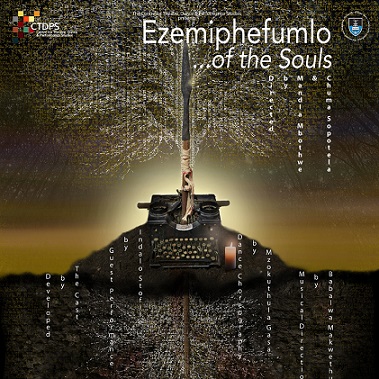
Ezemiphefumlo ...of the Souls
-
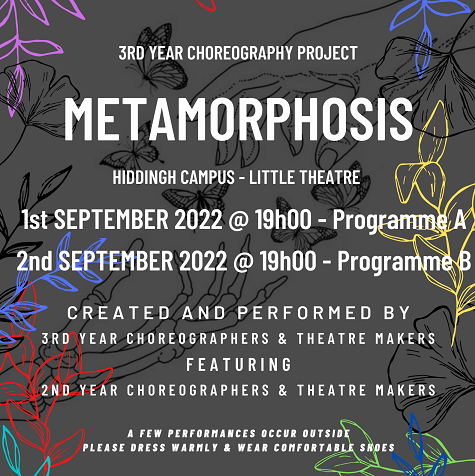
Metamorphosis
Third year choreography project involving third year choreographers and theatre makers. Featuring second year choreographers and theatre makers. -

MA Final Project | The Park
We have experienced multiple forms of trauma that often sit in our bodies, on our skin, and find insidious ways of seeping into our consciousness and contorting how we may think of ourselves. - Namanzi Choongo Mweene Chinyama, 2017 Thandeka finds herself with her head in the clouds and in The Park. This time in a pretentious park filled with people walking, kissing, and playing with their dogs while drinking overpriced Ethiopian roasted bean park coffee, people engaging in exercise: yoga, boxing, jogging, running- what are they running from?! Nanny’s sitting, chatting, and watching over children, black brothers in blue overalls manicuring the lawns and others in bright orange bibs safeguarding the space. Keeping it safe from who? This piece explores how race was designed in South Africa and the characters are presented with a whole of shit. Rage, fear, and doubt penetrate their seemingly blissful exterior as Thandeka grief opens wounds and finds herself questioning how she has come to understand her success and place in the world. She is living in a system that has failed her and the play explores the well-meaning lies we tell ourselves about freedom, equality and about justice. The tension comes to a head when the truth about how she feels about herself is revealed. There is something leaking, and tension builds as Thandeka unearths the truth of what she is thinking. -
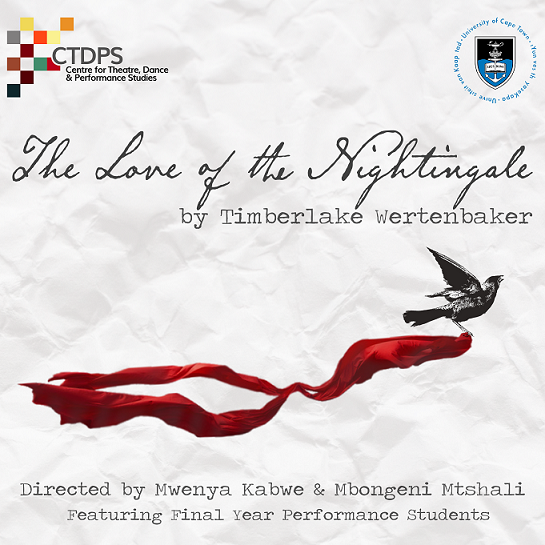
Love of the Nightingale 2022
The Love of the Nightingale tells the story of two sisters, Procne and Philomele, daughters to King Pandion of Athens, whose lives are turned upside down after the elder daughter Procne is married to Tereus, King of Thrace, and taken to live among his people. A devastating chain of events is set in motion when Procne asks Tereus to return to Athens to fetch Philomele so that she may join her in Thrace. After a horrifying act of violence on the long journey, Philomele is literally and figuratively silenced, and must ultimately transform in the face of trauma in order to reclaim her voice and finally reunite with her sister. Originally commissioned for the Royal Shakespeare Company, Timberlake Wertenbaker’s adaptation of this classic Greek myth is a profound feminist examination of patriarchal power, cultures of silent complicity, and overcoming cycles of violence and abuse through symbolic transformation. “What is a myth”, the Chorus reminds us, but “the oblique image of an unwanted truth, reverberating through time”? This story is important to us because of its continuing relevance to our collective worlds, and the uncomfortable truths about our own cultures of violence and misogyny that it forces us to confront. If power is enunciated through the violence of nations and the men who lead them, and complicit silence its enabler, this play challenges us to intervene in the seemingly banal, timeless continuity of that violence by giving voice, bearing witness, and insisting on other possibilities. -
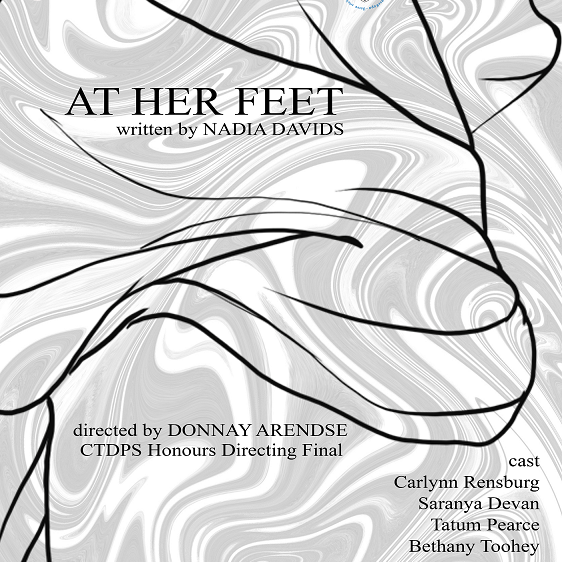
At Her Feet 2022
In this rendition of At Her Feet we journey through the stories and identity’s of 4 different Muslim women of color as the echoes of tragic memory house their body and mind. Directed by Donnay Arendse and performed by Carlynn Rensburg, Saranya Devan, Tatum Pearce and Bethany Toohey. In 2002, At Her Feet, written/directed by Nadia Davids and performed by Quanita Adams, exploded onto the South African theatre scene. At Her Feet evokes the experiences of four Muslim women in Cape Town whose lives are touched by 9/11 and by the honour killing of a Jordanian girl. These women – a secular student, a tough-talking auntie, a Che-worshipping slam poetess, a recently married religious travel agent- narrate their own lives, offering vivid, affecting, bitingly funny, deeply moving stories that speak to race, love, faith and belonging. -
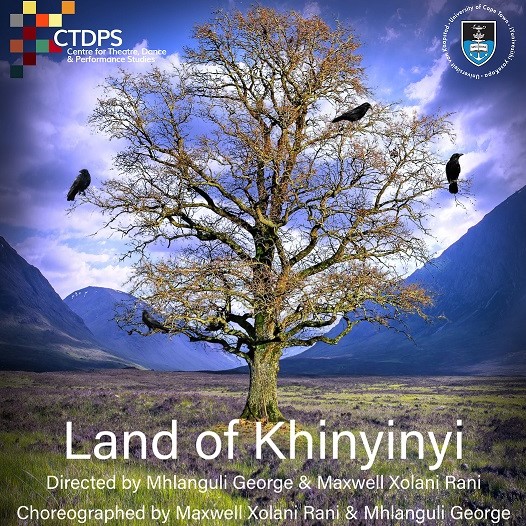
Land of Khinyinyi
This dance performance traces the story of a dark love and betrayal that poisons the village of Khinyinyi. Inspiration for this performance is drawn from the African religious practices of the Yoruba people of Southwestern Nigeria, specifically their Orishas (Gods and Goddesses). This narrative focuses on the four Orishas: Shango, Ogun, Oya, and Yemaya. The culmination of our research is a narrative structure and composition that sets this story in South Africa, where we believe it to be artistically relevant. We made use of the stories of the Orishas to stimulate our (re)imagining of material and dance vocabulary that encourage an embodiment of story. Through movement investigation and dramaturgy, we attempt to show how African stories from diverse countries can be similar and address common themes, while exploring this richness in diversity and potential for new fictional works. -
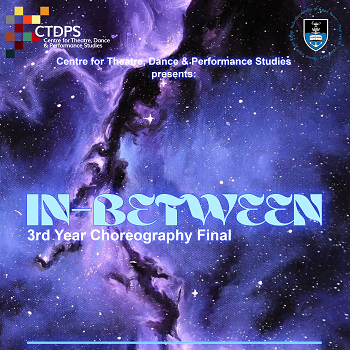
In-Between
"In-Between" is a choreographic work that displays the conceptual being of limbo. A state of being between states. Often times we find ourselves in situations that cause us to go completely numb, as we are neither sad nor happy. Our depiction of “In-Between” comes from our seemingly abrupt end to one journey and the overwhelming start of another, as we transition out of university into the professional sphere. Therefore, “In-Between” aims to question our reality, existence, our present, past and destiny. Is it one we create or has one already been created for us? “In-Between” is a collaboration between 4 talented choreographers. This work constitutes their final offering as undergraduate students of the CTDPS. Naheesha Heydricks; Cassidy Phillips; Mike Galeboe & Cassidy Van Rooyen. -
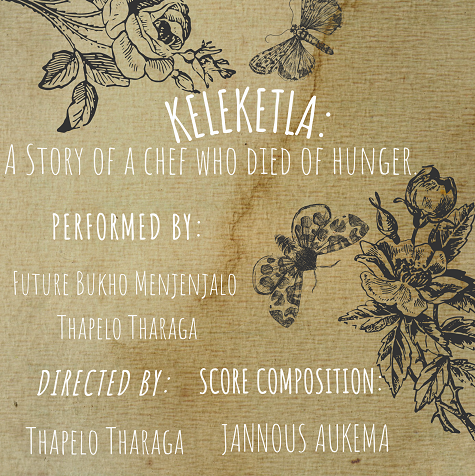
MA Final Project | Keleketla
Keleketla: A story of a chef who died of hunger An old eagle weaver bestowed with a gift to tell stories, lives in a world that is different to our own. A world where no child goes missing. But no great gift comes into the world without a curse. The thesis production concept is derived from the isizulu idiom "S'bindi uyabulala, s'bindi uyaphilisa", loosely translated as: Courage kills, Courage saves. This is my re-telling of the tragedy, Prometheus Bound, by Aeschylus. The tragedy is based on the myth of Prometheus, a Titan who defies the god Zeus by stealing fire and giving it to mankind. In response, Zeus punishes him by chaining him to a cliff and sending a bird to devour his liver. The punishment continues ad infinitum as his liver grows back every day and again the bird returns to eat his liver. This re-imagination of the Prometheus story shifts perspective by asking why does everyone focus on the man chained to the rock, what about the bird chained to the man? His gift or rather a curse of being forced to eat his liver ad infinitum. Mmoho and Tat’uhobe take turns in narrating a series of different stories around the central theme: courage saves, courage kills inspired by sePedi proverb, “Ke “khomo ya mosate, wa e gapa o molato, wa e lesa o molato”Loosely translated: “It's a Royal cow, you take care of it, you are guilty, you leave it you are guilty” - which in simple terms means getting caught between a rock and a hard place. This re-telling follows its historical context, it challenges authority and poses the question: “who has the liver to save us? -

MA Final Project | Bohareng
Bohareng is a performance experiment using text, physical theatre, song, drumming, and storytelling to enable an engagement between ancestors and the living through ritual performance. To frame the performance, Bohareng follows Khanyisile Mbongwa's elements of ritual performance - the remembering, the ancestral, and the spiritual. The "remembering is the act of tracing memory. The ancestral is the act of cultural recovery, the inheritance and familial. The spiritual is the act of connecting and positioning oneself through soulful alignment" (Mbongwa, 2020:11). -

MA Final Project | Op soek na Salem
Performance description: Sjuut, die lappe slaap. In her linen closet her heirlooms silently narrate the history of a German missionary's colonial expedition from Europe to Namibia in 1863. The performance Op soek na Salem/Searching for Salem, explores the tension between transgression and preservation of colonial inheritance. Abstract: MY SUN-PRINTED ARCHIVE IS BLUE I’m a white Afrikaner. I am spun from a villainous history- a vestige signifying coloniality. I have inherited a colonial archive that documents my ancestor’s journey as a Rhenish missionary from Germany to Namibia in the year 1863. From a contemporary present that is framed by post-colonial and postcolonial discourse, colonial archives warrant verwerking/ alteration/ processing/ working and reworking. Framed by practice-led research, this study uncovers how I can verwerk my colonial archive through performance to incite transgression of preservation, to move beyond the ossification of colonial heirlooms (my archive) to reconcile with emerging post-colonial futures ? In my performance, I transform my colonial archive into tactile textile - linen. Linen, in its entirety as ‘text embedded tapestries’ symbolises narratives, history and the past, all woven together to form what constitute the present. The word ‘lineage’ originates from the noun ‘line’. The word ‘line’ in turn, etymologically stems from the term lino meaning linen - the flax seed fabric (Miller 2005: 239). A single thread can therefore signify themes of genealogy, heritage, identity and ancestry (van der Merwe 2022: 2) . I am interested in modes of reworking and reimagining my colonial archive. I perform acts such as tainting, tearing, ripping, (re)stitching and untangling large tapestries of linen - embodying a scrutiny of my white colonial archive. In my performance research I demonstrate a ‘grappling with’ my colonial past from my contended post-colonial present. I ‘taint’, ‘scratch’ and make marks- as I attempt to insert new perspectives and self-reflective insight. Incited by my performance research, I uncovered the notion of poisoning and the image of a moth as two potent concepts in relation to the notion of verwerking . In relation to the linen- a moth has the capacity to devour, consume and process material (established as a metaphor for my archival text). The moth is me- devouring and processing my colonial text. Secondly, I taint the white bleached linen using cyano-type printing that results in mournfull, sickly blue stains and blotches smeared across the once white tapestries- signifying alteration and transgression of preservation. It can be stated that I poison my colonial text. From the poison emerges remedy and an attempt to reconcile with the past. I unpack the notion of poison alongside Jacques Derrida’s (1998) concept of pharmakon (poison as remedy). These alterations and indiscretions to my colonial archive and it’s text, offer emergence, allowing my ossified colonial archive to evolve beyond a preserved state. For me, my explication and performance research can ultimately become a new chapter in my family’s archive that reflects on a past that is interwoven and entangled up within villainous history that warrants acknowledgement and critical reflection. Nell van der Merwe (Actor) Morgan Jenkins (Stage Manager) Roberta Sonne (Stage Hand) Nell van der Merwe (Set and costume design) Nell van der Merwe (composed music and musician) Leigh bishop (Costume maker) Willem Wannenberg (Set Engineer) -

MA Final Project | Widdershyns
‘Widdershyns’ (adj): “Moving in a direction opposite to the usual, anti-clockwise or left hand ways, contrary to the apparent course of the sun.” Widdershyns winds a path from the ordinary…to elsewhere; exploring the vitality and animateness of materials, as well as the character of wondrous encounters which arise and then recede — charging the real with an afterglow of enchantment. Additional notes from the Director: "The performance featured one hidden aspect which was not revealed to the department. There was an instance of subtle illusion design integrated into the scenography. As the performance concludes and we shift back into the ordinary, the performer once again encircles the lamp at the back of the stage. As they make their last turn, they appear to melt away and vanish - the stage being left entirely empty. This was not an overt illusion, and some audience members did not notice it. Others however, were left not entirely sure whether to believe their senses; allowing the performance to linger on the line between reality and fantasy."
2021
-
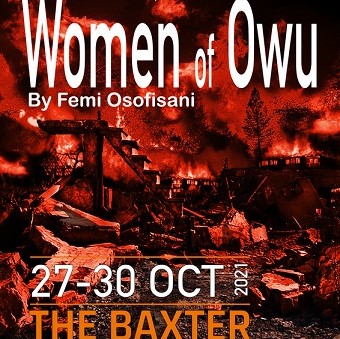
Women of Owu
Women of Owu, an adaptation by respected Nigerian playwright Femi Osofisan, of the classic, The Trojan Women, bursts on to the Baxter Flipside stage, from 27 to 30 October 2021, at 6pm with a Saturday matinee at 2pm. Presented by UCT’s Centre for Theatre, Dance & Performance Studies (CTDPS), in collaboration with The Baxter Theatre, the short season of only five performances, is co-directed by Imaan Isaacs and Mwenya Kabwe. The production showcases 20 CTDPS final year acting students, comprising Abigail Avidon, Lisekho Bulabula, Sidne Barnett, Tayla-Rose Bisset, Nomakhosi Meveni, Caitlyn da Aparecida, Adan Fagan, Dean Goldblum, Mpumelelo Phanginxiwa, Nahum Hughes, Cwenga Koyana, Bianca Lakey, Oratile Ndimande, Daniel Newton, Lyle October, Stian Oosthuizen, Lernice Parker, Tim Stadler, James Stoffberg and Lisa Tredoux. Musical direction is by Babalwa Zimbini Makwetu, costumes by Leigh Bishop, lighting design by Benever Arendse and set by Lungile Cindi. Osofisan is an internationally respected Nigerian playwright, director, scholar, activist, novelist, poet, actor and songwriter. In 2016 he became the first African honored by the International Association of Theatre Critics when he was awarded the prestigious Thalia Prize. Women of Owu is set in the ancient city of Owu, which Osofisan describes (in his notes on the play’s genesis), as a model of prosperity and organisation. After a seven-year siege, the combined armies of two Yoruba kingdoms, along with Oyo refugees, recruited as mercenaries, entered Owu and sacked the city. In the third year of the siege, the rains stopped, weakening the once formidable city and strengthening the Allied Forces camped on the other side of the city walls. When they entered the city in the seventh year, they destroyed Owu to the ground and reduced it to rubble. They set fire to the city and killed all the male inhabitants, capturing the women of Owu, as their spoils of war. The play takes place a day after the sacking of the city. This rendition of the west African adaptation, set in a dystopic African future, is laden with echoes of a timeless lament. Through their rituals of protest, the Women of Owu, lay bare the unspeakable trauma inflicted on them and the tactics of subversion they endured. Women of Owu’s brief season, runs from 27 to 30 October, at 6pm and a matinee on Saturday, 30 October at 2pm, in the Baxter Flipside. Age restriction PG. ‘’Our mission is to be an outstanding teaching and research university, educating for life and addressing the challenges facing our society”. Performances are limited to 50 percent capacity as regulated by lockdown adjusted alert Level 1 restrictions, with all COVID-19 protocols in place and to be observed. These include the availability of hand sanitisers, tracking and tracing recorded, temperature checks, mandatory wearing of masks and practicing of physical distancing. Audience members are advised to arrive at least 30 minutes before the start of the performance to avoid delays. -
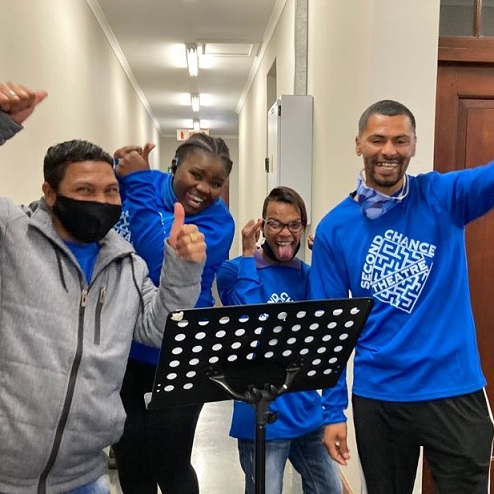
Frequent Fliers
Frequent Fliers (2021) is an audio drama based on interviews and stories told by members of the Second Chance Theatre Project. “Frequent fliers” is a colloquial term for repeat offenders. The script was written and performed by members of the Second Chance Theatre Project and students from the Centre for Theatre, Dance and Performance Studies. The Second Chance Theatre Project is an engaged scholarship project linked to the University of Cape Town. The aim of the project is to work with incarcerated and formerly incarcerated people to devise original theatre pieces, develop transferable skills in theatre, and through theatre to create opportunities for social reintegration. Second Chance Theatre Project works in the languages of the Western Cape and incorporates local performance forms wherever possible. Devised under COVID conditions, the script was collectively written and edited by project members with guidance from Zandile Mentjies and Veronica Baxter. The Project prefers to work through participatory improvisation, collective devising and scripting. The work is collectively owned, but the processes are guided by the principal research investigator, Associate Professor Veronica Baxter. The project has been funded as a Community Engagement Project by the South African National Research Foundation (2019 – 2021). The views and opinions expressed here are those of the creators. Frequent Fliers was performed by: Cornell Bouwer, Tracey Geland Block, Marwaan Mamwell, Zikhona Madlalisa, Ashley Myla, Matthew Petersen and Zandile Mentjies (Second Chance Theatre Project), and Nawaal Adams, Veronica Baxter, Gaby du Toit (UCT). Sound recording by Ronel Jordaan at the Little Theatre at UCT, and sound effects by Tracey Geland Block. Sound Editing by Naledi Majola. -

Happiness: something that it's not
Happiness: something that it’s not was the Sex Worker Theatre Group SA’s fourth production that formed part of the four-year GlobalGrace (Global Gender and Cultures of Equality) research project that investigates the variety of ways that equalities are made and contested in different parts of the world and how people’s creative practices challenge inequality and engender new possibilities for more equitable ways of living together. The project comprised five work packages from around the world that employed arts-based practices and multi-sensory research to investigate the production of cultures of equality and enable gender-positive approaches to well-being internationally. The South African work package engaged collaboration between the CTDPS, the AGI (African. Gender Institute) and SWEAT (Sex Workers Education and Advocacy Taskforce) and involved training sex workers in various theatre and performance practices. The training was divided into five clusters, four culminating in a performance. Happiness: something that it’s not was the culmination of street theatre and mask performance training. -

African Gumbo 2021
Annual African Gumbo production. -
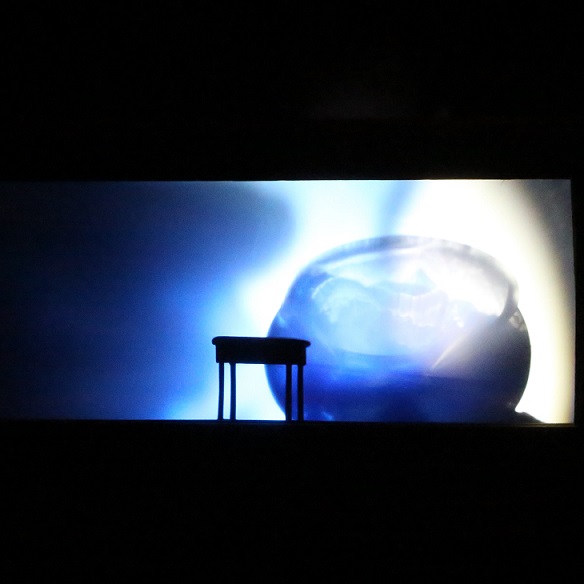
P3 Object Theatre 2021
These performances are part of the third years exam for the Object Theatre course. The Object Theatre performance is made in small groups (3 people per group) of approximately 10 minutes in length performed live at the end of the course with technical assistance. They are adapted from written short stories. The parameters and scope for this project are diverse. Material experimentation, object animation and practical making is encouraged. A demonstration of performance and theatre making skills in concert with the mobilization of materials and objects constitute the core of the project. Inspired by table top performances, it's recommend that each group limit the size of their playing space and that they think of doing that by making it an object or piece of furniture, that would give the ‘floor’ of the world they are trying to make and operate from. The course is facilitated by Jenni-lee Crewe, Jayne Batzofin and Iman Isaacs. -

35th Miner
"35th Miner" is the aftermath of the Marikana massacre, a story that captures the life of a young girl called Nomalanga who lost her father during the Marikana massacre in South Africa, 16 August 2012. In many Black cultures in South Africa, Black people align themselves with dreams and connect with them as memories, guidance and revelations. Nomalanga dreams about her father but it is painful and traumatising when one dreams of a particular important family member that was violently killed. This theatrical dance piece deals with the post traumatic disorder experienced by families that are still mourning their loved ones through the lens of a young girl, Nomalanga. -

Creative Tapestry
Creative Tapestry was the Sex Worker Theatre Group SA’s culmantive production that formed part of the four-year GlobalGrace (Global Gender and Cultures of Equality) research project that investigates the variety of ways that equalities are made and contested in different parts of the world and how people’s creative practices challenge inequality and engender new possibilities for more equitable ways of living together. The project comprised five work packages from around the world that employed arts-based practices and multi-sensory research to investigate the production of cultures of equality and enable gender-positive approaches to well-being internationally. The South African work package engaged collaboration between the CTDPS, the AGI (African. Gender Institute) and SWEAT (Sex Workers Education and Advocacy Taskforce) and involved training sex workers in various theatre and performance practices. The training was divided into five clusters, four culminating in a performance. Creative Tapestry was the culmination of the entire project and incorporated aspects of all the previous productions. The initial idea was to do a live closing event. However, Covid 19 facilitated the decision to translate the closing event into a film. -
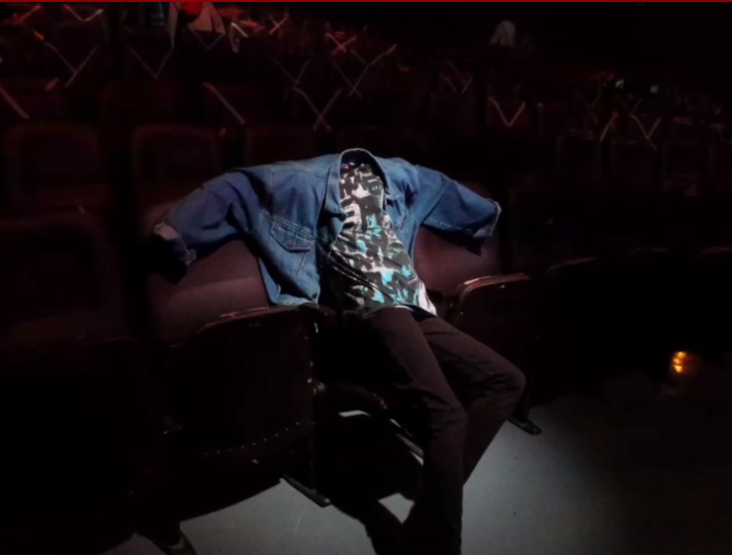
Theatre is Dead! Long live Theatre!
Theatre is Dead! Long Live Theatre! is a documentary theatre project by members of the 2021 graduating class at the Centre for Theatre Dance and Performance Studies at the University of Cape Town. This project, envisioned as a museum experience, responds to the National Arts Crisis and all the artists who took to their mediums to protest the major “funding irregularities” at the National Arts Council that have left artists in every discipline across the country without promised funding. Artists whose precarious livelihoods have already been severely impacted by the Covid 19 pandemic. Between what has been found to be “improper, corrupt, fruitless and wasteful expenditure” at the National Arts Council and a devastating global pandemic, it has been said that disciplines like theatre and performance are dead, having been dying for quite a while now, with smaller and smaller audiences and reduced funding possibilities. Those of us who make, frequent and support the theatre in all its guises know that this is fundamentally untrue. This has also been proven through the remarkable interviews conducted by the students for this theatre project. Interviews with ordinary people about their complex and profound relationships with the performing arts. These (extra)ordinary people who gave so graciously of their time included a professional ballet dancer with an illustrious career behind her, a dog walker, a South African artist living outside the country, a local comedian, a matriculant, a tattoo artist, an IT specialist, a professional chef, and a 94-year-old veteran fighter pilot. This museum-making project has delved into the archives of The Little Theatre on Hiddingh Campus, a so-called traditional theatre building, in which very many non-traditional events have been created, including this project. This work sits in a meeting of the archive and the contemporary, between the ‘dead’ and the very much alive, between the museum and the performance space. Among the opportunities of this time is to ask ourselves what other surprising things exist where theatre and the digital meet. To ask ourselves if a virtual self-guided museum tour experience contradicts the essence of theatre, or if it in fact creates alternative avenues of access to performance work. The website that accompanies the live work is an experiment in a new merged space between an online experience and a live performance project. In the spirit of the rare artistic solidarity demonstrated by the NAC protests, and by no small feat of timetabling gymnastics, this project has taken students out of their zones of comfort in their final year of study, and connected those studying dance, acting, theatre making and scenography together in this large collaborative creative endeavor. -
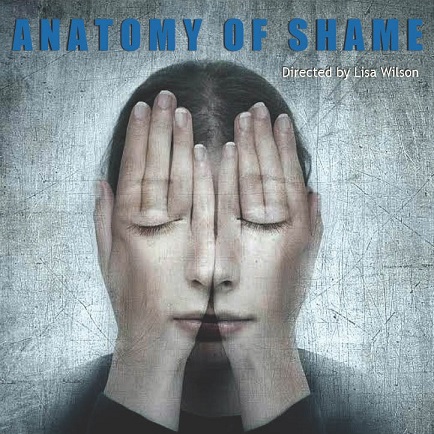
Anatomy of Shame
Anatomy of shame reveals a secret hidden for many decades in the halls and grounds of Ireland’s mother and baby homes. Through dance theatre, the performers embody the real-life, true stories of women and children who were forcibly sent to or sought refuge in these “homes” in the 20th century. Secret deaths, secret burials, exposed truths, public shame. Students engaged in secondary research to unearth the stories of these women and through a praxis of reflection, feminist embodiment, dance improvisation & choreography, voice and site-specific movement philosophies, Anatomy of Shame was created. -
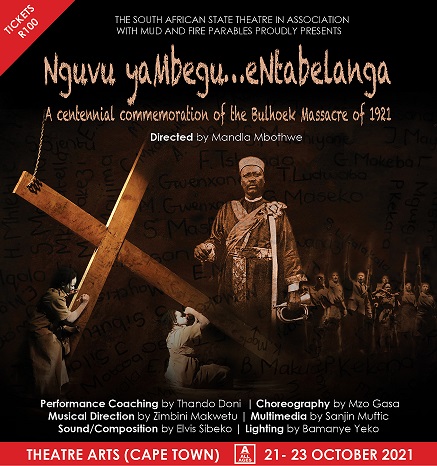
Nguvu yaMbegu...eNtabelanga 2021
Nguvu yaMbegu... eNtabalanga is a centennial commemoration of the 1921 Bulhoek Massacre Nguvu ya Mbegu is a Swahili title meaning the power of the seed. The work was originally devised by students at the Centre for Theatre, Dance and Performance Studies at UCT, under the direction of Mandla Mbothwe, and is performed in isiXhosa, isiZulu, SeSotho, SeTswana, and Swahili. Nguvu ya Mbegu strongly draws its aesthetic from African storytelling traditions, incorporating dance, song, and ensemble work. It is an excavation of the tragedy of the Bulhoek Massacre of 1921 where 193 people were shot dead for refusing to leave their mountain of prayer, eNtabelanga near Komani. This performance marks the 100th year anniversary of the tragedy and is a resistance against persistent narratives that continue to erase black history. Collectively scripted and created by past and current cast members. The play was initially researched and created with 2nd year students from UCT’s Centre for Theatre Dance and Performance Studies (CTDPS) in 2017 under the direction of Mandla Mbothwe with song composition and musical direction by Nolufefe Mtshabe. It was an attempt to excavate the invisible story of the Bulhoek Massacre of 1921 eNtabelanga in the Eastern. The work formed part of the Nguni Bilingual curriculum whose objective is to both centre indigenous languages in teaching, and also indigenous knowledge, theatrical traditions, and pedagogical practices. In 2019 the production was revisited, and this time staged as a semi-professional student production at the CTDPS’ Little Theatre with four sold out performances. This iteration was also directed by Mbothwe, but this time with the choreographic input of Mzokuthulu Gasa, musical direction by Bongani Magatyana, and original sound composition by Elvis Sibeko. Zimbini Makwetu came in as the vocal coach, Chuma Sopotela as the acting coach and Jackie Manyaapelo as the movement coach. That same year, the production toured to National Arts Festival, Makhanda where it received a Standard Bank Ovation Award. The creation of this work has been an opportunity to reflect on religion, spirituality, history and the complicated discourse around these. We hope that exhuming the dead of the tragedies we have faced help us to understand ourselves today. By encouraging linguistic inclusivity and mainstreaming national memories, Nguvu ya Mbegu is attempting to write our indigenous languages into the lexicon. The work explores the many complexities of South African history, and therefore South African life, encouraging the gathered community of performer and audience to collectively reflect on erasure and the possibility of recovering ourselves through active remembrance. The original cast members include Lungile Lallie, Luhle Macanda, Mamello Makhetha, Katlego Lebogang, Zolisa Nkonyana, Mfundo Zono, Zizo Solontsi, Lwanele Ngqambi, Anathi Rubela, Mthuthuzeli Zimba, Lukhanyiso Skosana. -
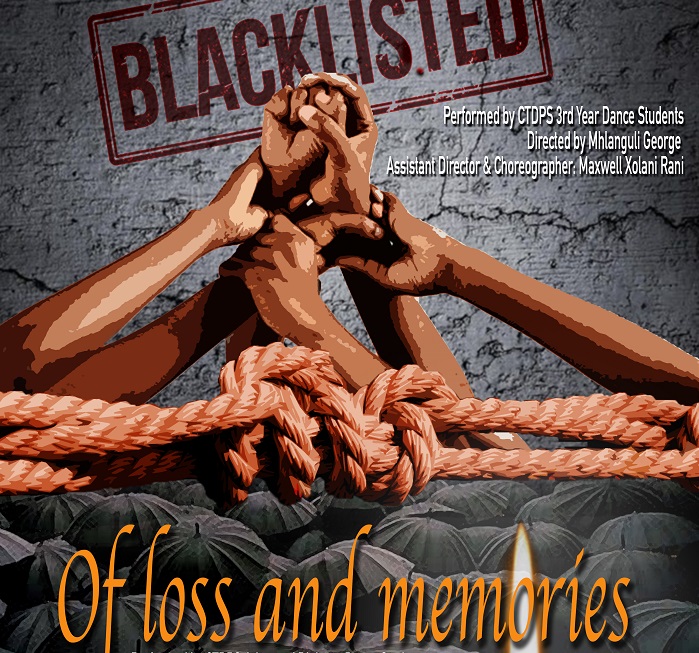
Dance UCT 2021
The challenges of COVID that started in March 2020 have spilled over into 2021, and the final year students and staff have remained resolute and determined throughout. This tenacity and resilience makes us very proud. The works in our programme are emblematic of our contemporary lives - buoyant in a sea of difficulties and possibilities. ACT ONE: Of Loss & Memories, performed by CTDPS Advanced Diploma Dance Students and directed by Lisa Wilson explores individual journeys with losing a loved one. The sound…the space… the silence. Memories of what was and what could be encircle the open space left by death. ACT TWO: Blacklisted, performed by CTDPS 3rd Year Dance Students and directed by Mhlanguli George with Assistant Director & Choreographer: Maxwell Xolani Rani. Blacklisted is an interweaving of a series of narratives surrounding the impact of familial financial obligation placed upon the youth. Although each facet of the work follows a different character’s journey and struggles, the commonality shared by all is that "Black tax” costs each and every one of them so much more than money. Blacklisted explores themes of internal conflict, familial expectation and acceptance, fractured marriage and so much more… -
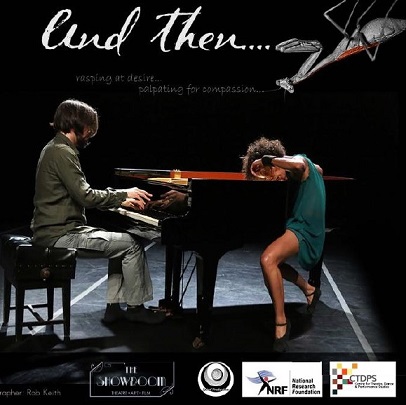
And then... 2021
“And then…” is all about desire that lies beneath the surface and thus, often kept secret. Desire vibrates, agitates and encounters what seems strange and different to convention. This production awakens and reveals what is secret and takes audiences on an insatiable journey of yearning. And then… uncovers salacious appetites, cravings, and wants of something or someone that is not immediately available and remains out of reach. “And then…” will fluster and inflame, tug at the heart and expand how we imagine and play ourselves in everyday life.
2020
-
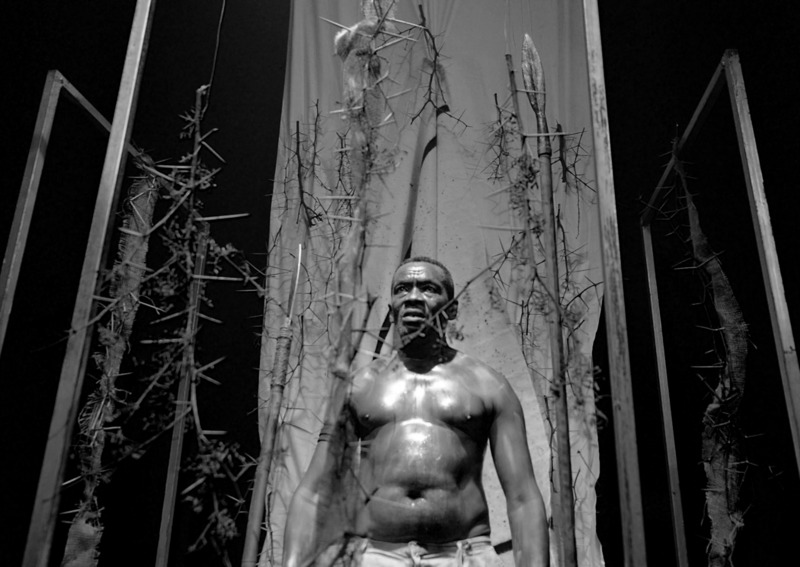
iKrele leChiza
Mandla Mbothwe’s IKrele leChiza…. [The Sword of the Herb], is the second in a series of performance research projects that is engaged with the reimagining of tragedy in Africa. It is driven by an interest in reimagining the genre of ancient Tragedy through an African lens. In an article from the 1960s entitled The Fourth Stage, Nobel-laureate Wole Soyinka writes: “of all the subjective unease that is aroused by man’s creative insights, that wrench within the human psyche that we vaguely define as ‘tragedy’ is the most insistent voice that bids us return to our own sources” (Myth, Literature and the African World, p. 140). In this project Mbothwe will explore the Greek epic the Odyssey by Homer in order to discover how it might talk to his own creative work and obsessions, and how his work talks back to the epic. While the epic form, strictly speaking, precedes tragedy historically it can be said to be tragedy’s precursor and it deals with much of the same mythic base as does tragedy. The difference on a superficial level is that while epic is characterized by narration, tragedy is characterized by dramatization. But given the particularities of the African performance tradition, the epic is much more closely linked to traditional forms like the intsomi or the griot tradition of West and Central Africa.) -
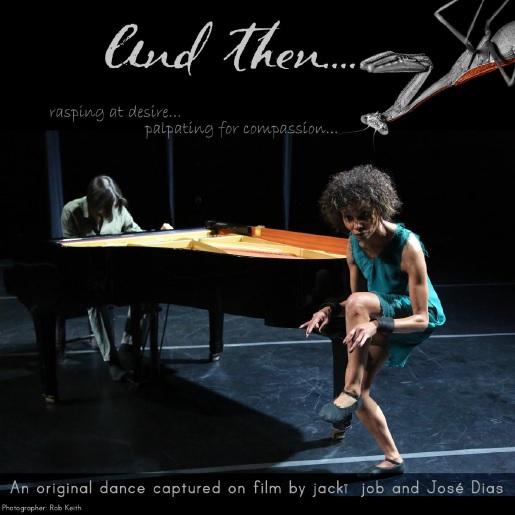
And then... 2020
“And then…” is all about desire that lies beneath the surface and thus, often kept secret. Desire vibrates, agitates and encounters what seems strange and different to convention. This production awakens and reveals what is secret and takes audiences on an insatiable journey of yearning. And then… uncovers salacious appetites, cravings, and wants of something or someone that is not immediately available and remains out of reach. “And then…” will fluster and inflame, tug at the heart and expand how we imagine and play ourselves in everyday life. This version was presented as a film. -
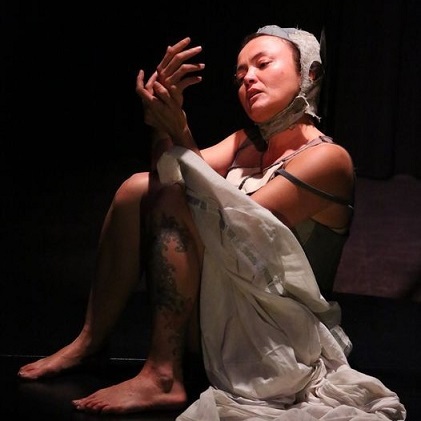
Brandbaar
Brandbaar is the Afrikaans translation of the acclaimed production, Womb of Fire. This translated version was staged at the 2020 Woordfees Festival and the 2021 Suidoorserfees. It was reworked/redirected for the KKNK 2021 online festival. As such, the production was further translated for film (filmed as a theatre production in a theatre. The result is a hybrid between theatre and film. Set against an episode from the Indian epic, The Mahabharata, the play interweaves personal narrative and contemporary realities with the lives of two women from the founding years of the Cape Colony to interrogate the Womb of Fire that birthed South Africa. The play follows Grote Katrijn van Pulicat’s (1681-1683) journey across India to Batavia and then to Cape Town as the first female bandit slave; it then explores the briefly brutal life of Zara (1648-1671), a Khoekhoen servant woman who was violently punished posthumously by the VOC for the crime of suicide. Womb of Fire looks at the power of the performing female body to challenge the pornography of Empire, in the process decolonising and retrieving itself. The play reaches back and forward across time to reassemble the dismembered body, allowing it to speak. -

Blood Wedding
“To burn with desire and keep quiet about it is the greatest punishment we can bring on ourselves”. Nationalist sympathisers murdered Spain’s celebrated dramatist Federico García Lorca shortly after the outbreak of the Civil War in 1936. Whether the assassination was politically motivated is however a subject of debate. Lorca’s innovative plays are renowned for their evocation of the profound and primitive passions of Spanish rural life. His Blood Wedding (which he subtitled ‘a poetic tragedy in 3 acts and 7 scenes’) is based on a newspaper fragment which told of a family vendetta and a bride who ran away with the son of the enemy family. Bloodshed and deaths followed when they were hunted down and killed. Lorca used this story to investigate the subjects which fascinated him: desire, repression, ritual, religion and the constraints and commitments of the rural community in which the play is rooted. The landscape of Blood Wedding is a poetic one of heightened language, song, music and rhythm. Lorca employs the symbols and images which pervade most of his writing… blood, steel, the moon, horses, death, bulls, dark woods and heady flowers. Whilst Lorca knew political and sexual oppression intimately, Blood Wedding is not concerned with regime change. Instead, it recognises how the flames of passion can be stamped on and stifled but never put out. His now classic tale of passion is dangerous, fast paced and ultimately a story about the yearnings of the heart which can never be commanded. Cast: Servant/ Chorus - Anathi Godlo Death/ Chorus - Batsetsana Motloung Mother/ Chorus - Bokang Ntsutle Leonardo - Brett Ilsley Father/ Chorus - Cullum McCormack Wife of Leonardo/ Chorus - Emma-Jane Pieters Girl/ Chorus -Klara Schoonraad Bridegroom - Liam Walsh Mother-in-Law/ Chorus - Megan Tromp Moon/ Chorus - Samuel Alexander Bride- Tamzin Williams Woodcutter/ Chorus - Tebatso Molapo Neighbour/ Girl/ Chorus - Tshiamo Moretlwe -

Covid Waarheid: Covid Truths
Covid Waarheid: Covid Truths was the Sex Worker Theatre Group SA’s third production that formed part of the four-year GlobalGrace (Global Gender and Cultures of Equality) research project that investigates the variety of ways that equalities are made and contested in different parts of the world and how people’s creative practices challenge inequality and engender new possibilities for more equitable ways of living together. The project comprised five work packages from around the world that employed arts-based practices and multi-sensory research to investigate the production of cultures of equality and enable gender-positive approaches to well-being internationally. The South African work package engaged collaboration between the CTDPS, the AGI (African. Gender Institute) and SWEAT (Sex Workers Education and Advocacy Taskforce) and involved training sex workers in various theatre and performance practices. The training was divided into five clusters, four culminating in a performance. Covid Waarheid: Covid Truths was a play reading that culminated the training in Spoken Word and writing from the self methodologies. -
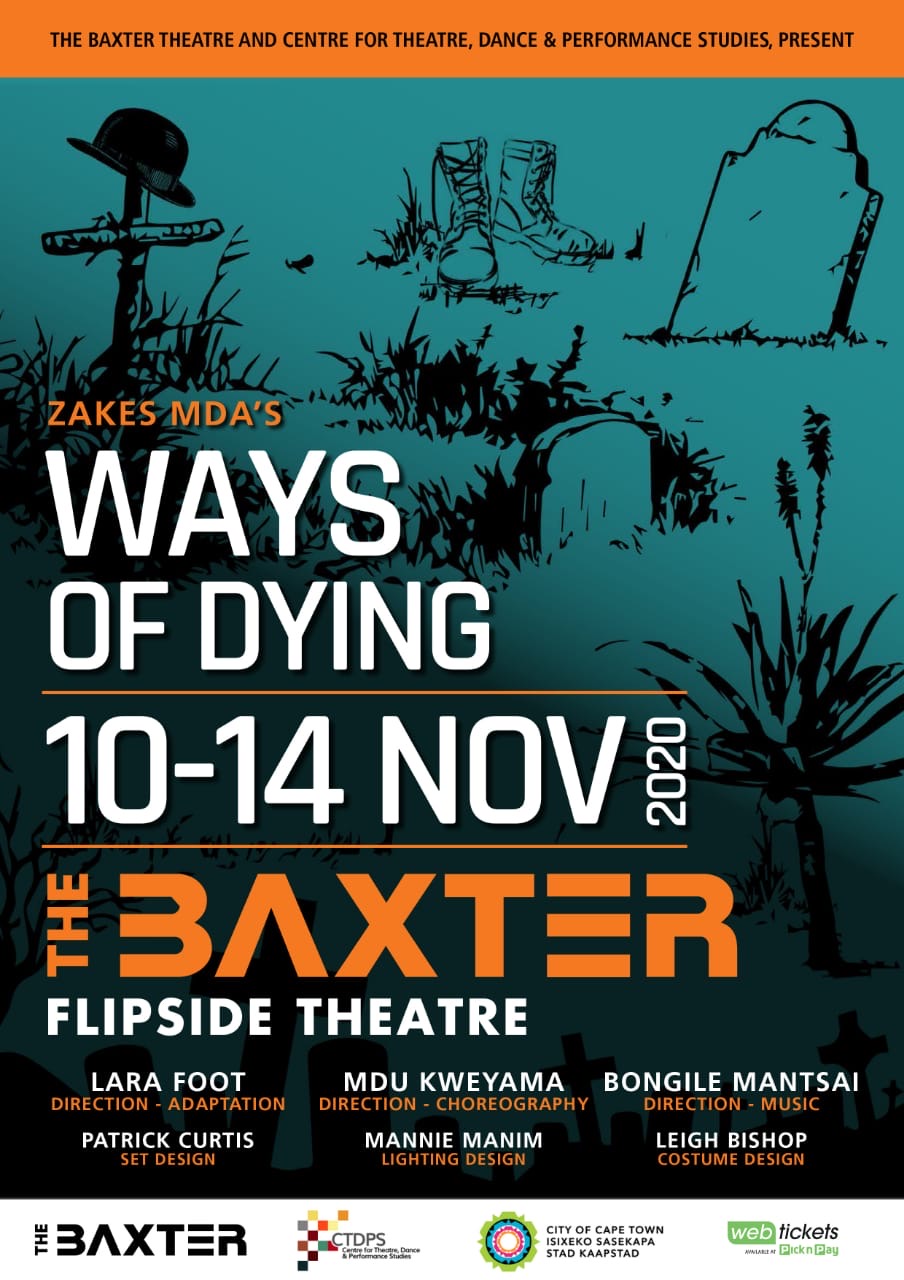
Ways of Dying
Zakes Mda’s acclaimed first novel, Ways of Dying, will be presented by the Baxter Theatre Centre and UCT’s Centre for Theatre, Dance & Performance Studies (CTDPS), at the Baxter Flipside for six performances only, from 10 to 14 November at 7pm, with a Saturday matinee at 3pm, on 14 November. Adapted and directed by Lara Foot, who directed the work 20 years ago at The Market Theatre, the cast is made up of 14 fourth-year students from the University of Cape Town’s Centre for Theatre, Dance & Performance Studies (CTDPS). The formidable award-winning creative team comprises Mdu Kweyama (direction and choreography), Bongile Mantsai (direction and music) with set design by Patrick Curtis, lighting design by Mannie Manim and costume design by Leigh Bishop. All performances will be limited to fifty percent capacity, with all COVID-19 protocols observed as regulated at Level 1 lockdown restrictions. These include the availability of hand sanitisers, tracking and tracing recorded, wearing of masks, physical distancing and audience members are advised to arrive an hour before the start of the performance to avoid delays. “The CTDPS is thrilled to be collaborating with The Baxter on our final fourth-year production,” says Sara Matchett, head of the CTDPS. “2020 has proved to be exceptionally challenging in terms of teaching in the Performing and Creative Arts departments at UCT. The loss of face-to-face contact teaching due to the COVID-19 pandemic has impacted our programmes enormously.” She continues, “The collaboration with The Baxter and with Lara Foot as director, promises to offer our graduating Acting students an experience that will make up for what has been lost. And a theatrical treat for local audiences to experience this work and creatives involved.” The cast comprises Liam Walsh, Tamzin Williams, Megan Tromp, Frances Sholto-Douglas, Klara Schoonraad, Emma-Jane Pieters, Bokang Ntsutle, Basetsana Motloung, Tshiamo Moretlwe, Tebatso Molapo, Cullum McCormack, Brett Ilsley, Anathi Godlo and Sam Alexander. The story follows Toloki an eccentric and dignified professional mourner, who meets his childhood friend Noria, at her son’s funeral. They fall in love and move in together, each one teaching the other how to heal and live. Ways of Dying is the 1995 novel by South African novelist, poet and playwright, Zakes Mda who has won a several major South African and international literary awards for his work. The book received the M-Net Book prize, and it was shortlisted for the Central News Agency (CNA) Award and a Noma Award. Some of his other works include The Heart of Redness, Our Lady of Benoni and The Zulus of New York. The Mail and Guardian described the book Ways of Dying as “… a moving and startingly original novel …” and veteran writer Sindiwe Magona said, “A flawless, intricate, seamless weave, with magic and mystery … Mda is a master storyteller”. With only six performances from 10 to 14 November at 7pm and a matinee on 14 November at 3pm, ticket prices for Ways of Dying are R75 and R50 for students. Booking is through Webtickets on 086 111 0005, online at www.webtickets.co.za or at Pick n Pay stores. For discounted school or group block bookings, fundraisers or charities, contact Carmen Kearns on 021 680 3993 or e-mail her at carmen.kearns@uct.ac.za. -
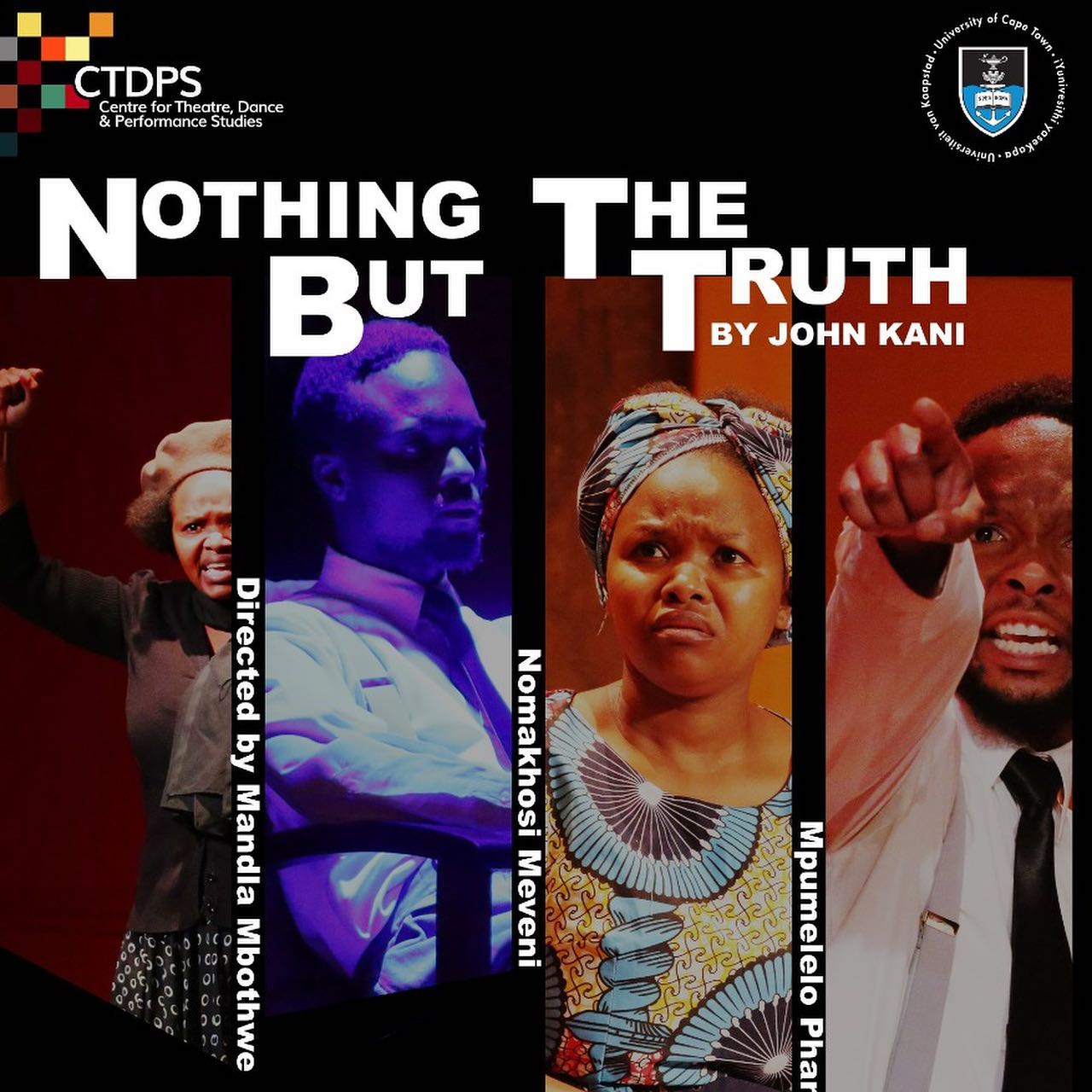
Nothing but the Truth
Presented by UCT’s CTDPS and featuring graduating 3rd Year Theatre & Performance students, this partially translated isiXhosa adaption of John Kani’s debut as sole playwright, “Nothing but the Truth” uncovers the secrets of sibling rivalry, of exile, of memory and reconciliation, and the ambiguities of freedom in a fledgling democracy. In a first for the UCT CTDPS, the performance will be available via a live streaming on Friday 13th November 2020. Directors note: Since my first experience of the play, I have always been haunted by the line “The taking never stops” from ‘Nothing but the Truth’ by Dr John Kani. This was and remains of the most reflective piece of work to the lives of the black people at the time of the first black democratic elected president and of the Truth and Reconciliation Commission - one of the major breakthroughs in post-apartheid South Africa. This was the time of the exiles returning home. The choice and exploration of staging the work is the result of many years of being haunted by these lines and the desire of imagining it being partly translated into isiXhosa. Translated and adapted by the performing company. The show is performed by Mpumelelo Phanginxiwa and Nomakhosi Meveni. Directed by Mandla Mbothwe with lighting design by Bamanye Yeko, set design by Lungile Cindy, Sound Scape by Elvis Sibeko and under the stage management of Thando Doni. It is the story about family secrets and conflicts, a story about siblings, about traditions versus so called “modern ways”. It is a story that actives memory, about truth, deferred dreams and reconciliation of black south African. People who know my work, my processes of making that work which in turn gives a greater influence on its aesthetics may have the same shock that I have when I first saw my John Kani’s ‘Nothing but the Truth’ set on stage. As a director, I have never been found attracted to someone’s writing in a way that I want to put it on stage. And on the rare occasion that it does happen, it is because I had found something so strong in the writing that it continues to dictate my heartbeat in times of my creative process. Even so, I must always find my voice as a way of breathing new life into an old story. I must always find a way to have a deep conversation with the writer and previous directors and actors and combine this with the current time, context, circumstances and desires. The following where these given circumstances: -First, we knew we wanted not only to reclaim the story in content but own it in Language. For this reason, we had set out to translate 70% of the script into IsiXhosa. This was also due to the fact that the production needed to cater for the Bilingual acting stream for our graduating students. -Second was the unforeseen circumstances of losing one student due to personal reasons during the rehearsal process. All these for me and for the actors provided a glimpse and sites of what I call the Stories’ gift to the teller. Once the actors were convinced that the process had not collapsed, and that it was still possible to tell the story without the third actor, we were all driven by faith and trust that the story being created in the rehearsals and the original script will give us a direction. It is the most rewarding experiences when hearing some of the translated sections, phrases and words to realize how much meaning and resemblance they carry to those that speak the language and from whose culture the story originates. As a person who has watched John Kani as an actor, public speaker and writer, I could now truly hear the narrative of his heartbeat. It is through this process that we seek to find out more about these characters and what they really represented in the lives of Black South Africans during that mutated time of fear, excitement, hope and despair. During that time of public storytelling of gruesome acts of apartheid rule, all while the rest of the world was watching. During the time when the national agenda was to heal the country through individual stories. Where all pains where painted with the rainbow colours and dreams of better futures for all, where the golden pedestal was sold so intensely to us that if anything seemed to be in contradiction with those spirits, it was perceived as evil, for it was against peaceful progress. It was also the time of violence in black townships and other communities which was orchestrated by various forces, driven by political agendas. Once again, just like in times of apartheid, the blood, the death, the funerals, the destroyed dreams, the buried hopes, the silenced voices, the burnt crop field were those of the black people, the poorest and the majority of the country. -
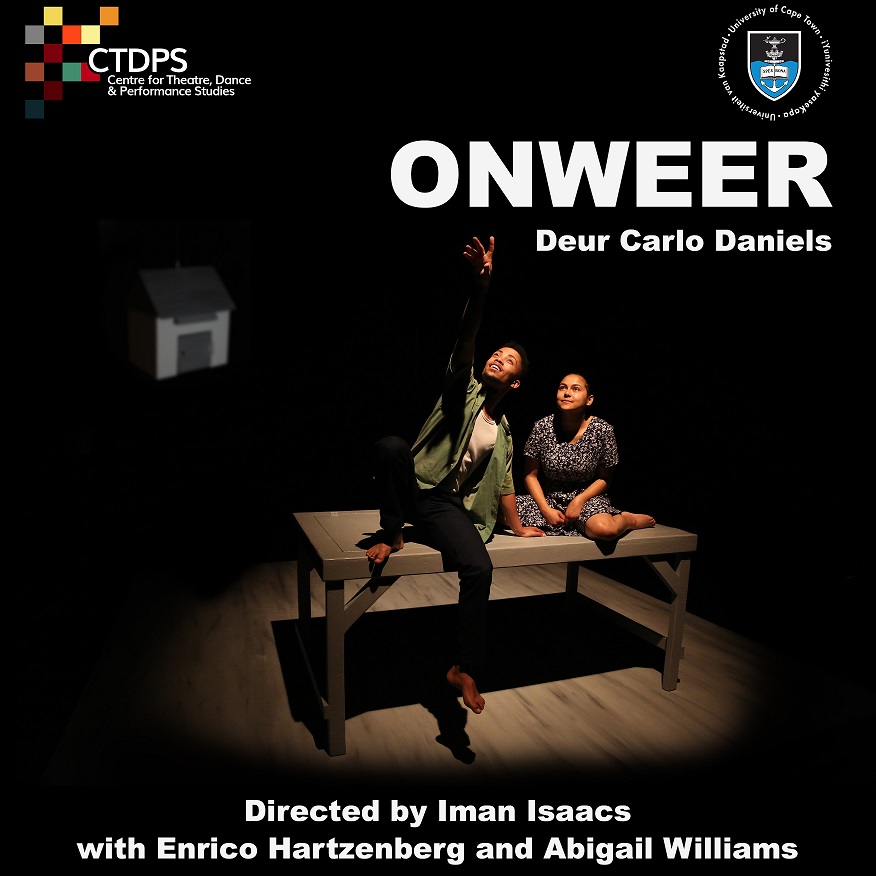
Onweer
Onweer is about the abusive relationship between a father and daughter and makes powerful social commentary on the justice system in South Africa. This rendition is multimodal and was created within COVID-19 restrictions, treated as part of a physical conceptual approach to Gender Based Violence. While topics such as GBV and Sexual Abuse are of paramount importance, and needs the spotlight especially now, scenes in this show may be triggering for some. Sound designed by Dean Balie and Lighting designed by Themba Stewert, this physical theatre interpretation is performed by Enrico Hartzenberg and Abigail Williams, under the creative direction of Iman Isaacs. Director’s Note: Directing Onweer during the global pandemic called for a new approach to making, where space and distance needed to be re-negotiated. An approach informed by safety protocols, disinfecting, sanitizing and fogging which created new ways of being and engaging with one another. This resulted in a way of moving influenced by impulse, action and reaction. Constantly asking what happens when my personal space is infringed upon? When the 2m allocation is violated? I would like to thank the actors for their positivity, trust and dedication to the project. For their hard work, understanding, commitment and professionalism from working online WhatsApp calls and zoom meetings to moving into the rehearsal space. Working on this production, at this pivotal social time, will forever hold a particular sensitivity to space, people and process. -
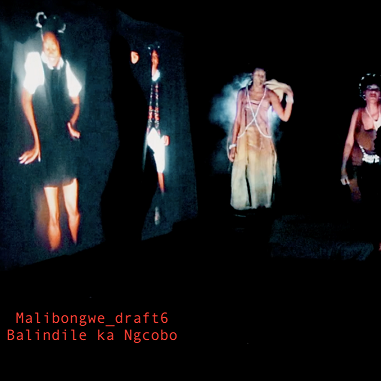
MA Final Project | Malibongwe_draft6
Synopsis: An influencer, Vee, is selected to test a new piece of Virtual Reality technology that allows her to enter and experience alternate realities. When she tries it on, she is transported into the bodies of various historical South African woman-characters. As the device malfunctions and the characters and worlds begin to bleed into one another, Vee is inundated by impulses to portray and give voice to the various experiences of these women, but this comes at a cost to her own body and mind. Description: Malibongwe is an Africanfuturist one-woman play that blends live performance and technology to stage a digital seance. The play re-calls the women of the past into the present moment in order to interrogate and re-imagine the tropes of womanhood that have been established throughout South Africa’s theatrical history. As the characters come back to life to have their say, the play also tackles the effects on the performer of having to portray the multiplicity that is South African womanhood. The play features the protagonist, Vee, as well as Zandile (from Gcina Mhlophe’s Have You Seen Zandile?), Sarah Baartman, the prophetess Nongqawuse, Elsa Joubert’s Poppie Nongena and Queeny (from Athol Fugard’s Nongogo). All of the characters are played by Balindile ka Ngcobo. -
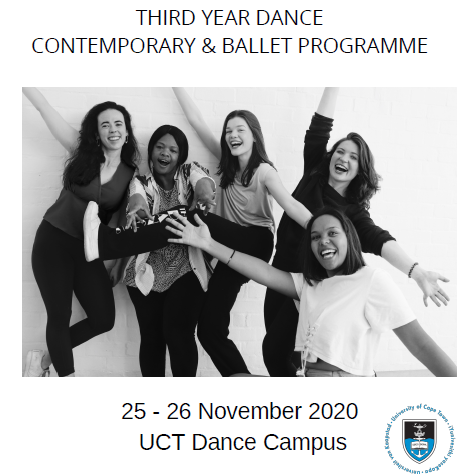
P3 Dance 2020
The P3 Studiowork course at the 3rd year level for the Performance stream students extends the skills sets acquired in previous / foundation years. The course has looked at technical development, body conditioning ( including strength and control), personal interpretation and how to develop an increased awareness of notions of repertoire from various dance genres. Once again we set out to strengthen our technical expertise as dancers/performers through our investigation and engagement in a variety of dance forms and key themes including loss, betrayal, hope and renewal. In 2020, inspite of great challenges that we all experienced, the students and teaching staff have continued to work hard at developing our competences through a firm engagement in contemporary dance and classical ballet. Thank you to our dedicated teachers Robin Van Wyk and Louise Coetzer for their generosity. And, to Abeeda Medell and Maxwell Rani earlier this year. Some of our work was undertaken online and we have battled through the experiences of limited contact/face to face teaching given the COVID 19 regulations and national state of disaster. In spite of COVID 19, we have persevered, learning to work even more independently and how to become more innovative and creative especially in our use of screen dance/ dance on film. We have embraced the ‘new normal’ even as we explored our final theme: post-modernist ideas of fracture, layering, change and de-constructivism for our performance work ( even our title has changed from ‘Grape to Bathilde to ..unknown landscape’). Some of you will recognize hints, clues and other subtle references to iconic concert theatre dance works. We know that you will nevertheless be enveloped in our poetic imaginings. As young artists we continue to reply to all that is happening around us. We hope you will also join in on our enquiring conversation through dance and the performing body. -
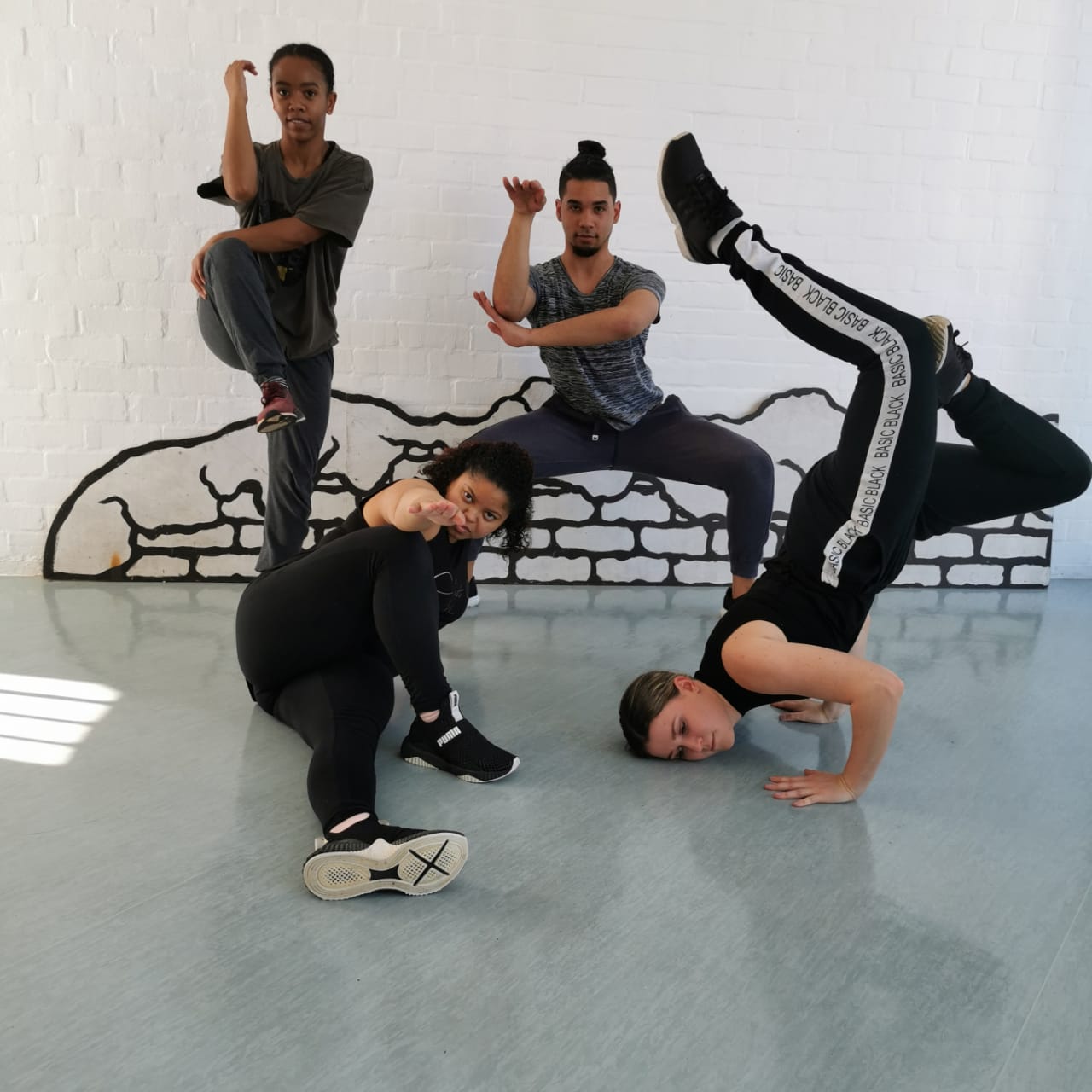
Dance Honours | Taboo
The CTDPS Honours students present as part of their Honours Dance course an articulation of their practice as research work entitled Taboo: To drag, worship and sanitise hip hop on Friday 27 November at 7.30pm. at the Dance Studio Theatre, UCT Lower campus. Four very different students have worked under the challenging condition of lockdown during the Covid 19 Pandemic and have come up with brave dance works as they continued to experiment and explore their central critical question. The four, short works of 20 minutes each are: Entitled Connected with choreography by Durban based Jaime Montgomery, Jaime responded to my question on her artistic and research process by noting, “When COVID and lockdown happened I turned to the internet to find online dance classes. There was so much ballet, but other forms and styles of dance seemed absent. Is it possible to establish an emotional or intimate connection in the online the online space?”. Choreographer, Michail Labans added that his work entitled: Fantasia has nothing to do with Disney or waltzing hippopotamus. He remarked, “Ja Julle moffies! I’ve heard so many words to describe Drag queens of Cape Town but who knows what their lives are really like. Just big hairdos and ‘hakke’. Nancy! Kom ek wys julle”. The poignant work navigates the world of drag artists who Michail claims are underrepresented in dance scholarship. Entitled: The Emancipation by choreographer Chantal de Wee probes the experiences of women dancers wanting to express themselves in praise and worship. Chantal has observed the patriarchal hegemonies in liturgical dance and especially in the context of the Northern suburbs, Cape Town. She looked forward to the feedback her sensitive work will generate. Finally, entitled “I’m stuck between hip hop education and hip-hop pedagogy!” Robyn Settler is hopeful that audience will support her call for greater inclusion of urban street dance forms in universities countrywide. Robyn’s passion for the form explodes onto the stage and she has worked hard to teach and build confidence in her dancers some of whom are new to the form. Taboo… has one performance only on Friday 27 November and limited seating. Please note a maximum of 25 persons, all of whom must meet all UCT COVID protocols, will be allowed entry to the venue. -

Dance Advanced Diploma Programme 2020
The Advanced diploma is a one-year programme of study that extends the academic thinking and creative processes of the three-year diploma in theatre and dance. It also further prepares students for postgraduate studies in creative practice, pedagogy and research. The onset of COVID-19 shifted us into the digital space. The shift afforded our students new opportunities to fulfil their collaborative project requirement to embody and choreographically structure deep and personal agitations in an interdisciplinary medium. For the first time this year, the Advanced diploma dance students will present four dance films, choreographed and directed by themselves in collaboration with South African film maker Oscar O’ Ryan. Dance films, video dance, dance for camera or screendance as it is sometimes called is a constantly evolving and rapidly growing art form that is contemporary in its interdisciplinary practice. In screen dance, movement, choreography and filmmaking merge to create a new visual art form with a modern expression. This evening’s program begins with movement excerpts taken from the dance technique aspect of the course followed by the screening of the dance films. Thank you for bearing witness to our students’ 2020 journey into screendance. -
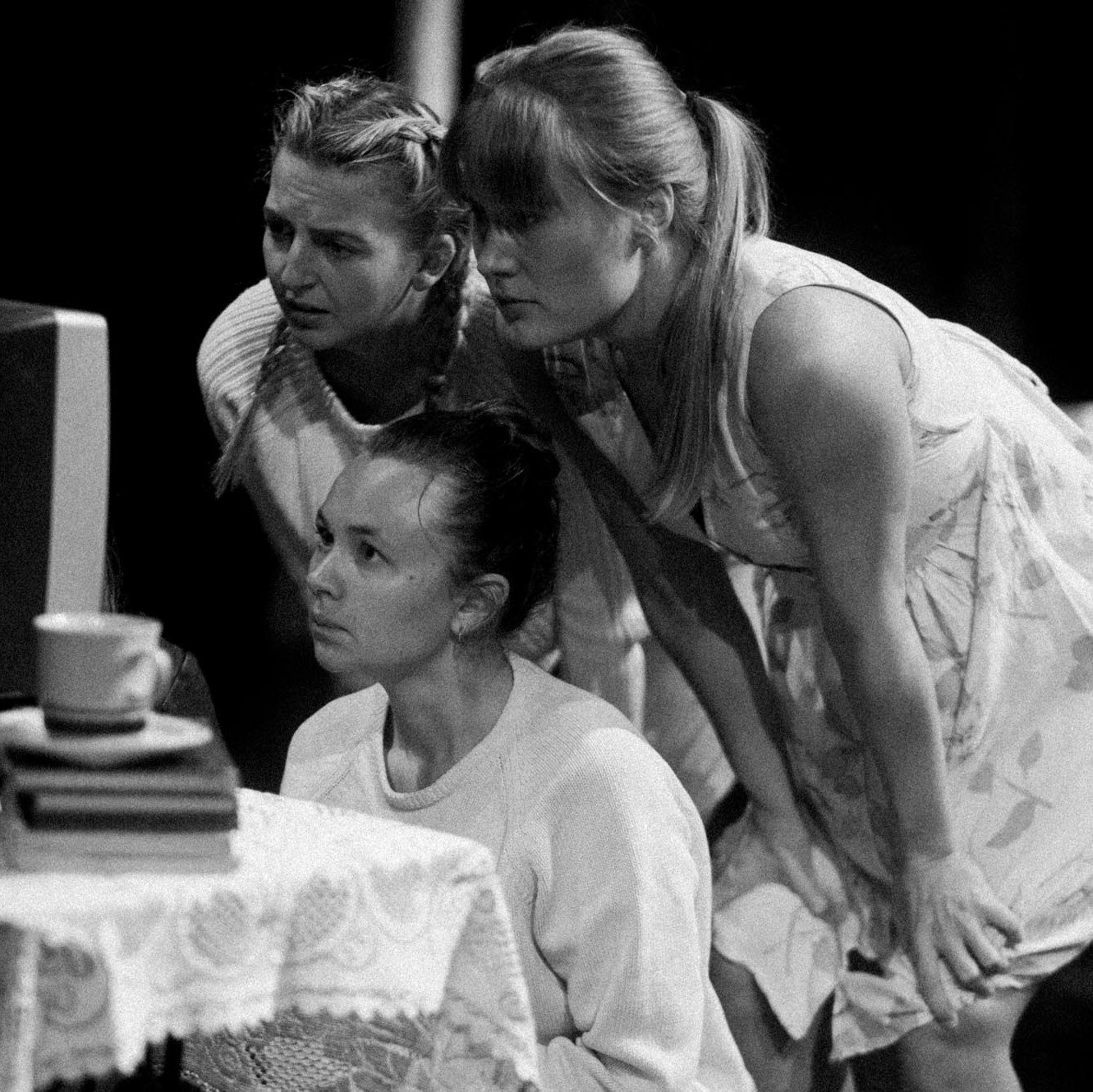
MA Final Project | ma
*English* ma, is an experimental play-film that served as the final project of Kanya Viljoen’s masters. The piece makes use of the classic notion of the chorus within a tragedy and questions how the choir functions within contemporary South Africa, specifically in relation to the Afrikaner identity. In ma, a chorus of ‘daughters’ seeks to ‘talk back’, ‘perform back’ to the Mother(tongue), with a specific emphasis on the Afrikaans language as spoken object. Therefore, the performance ma, not only refers to the specific relationship between a mother and her daughter(s), but seeks to encapsulate various metaphors around the mother figure. These include the mother tongue, Afrikaans, which in itself could be argued to encapsulate the white, Afrikaner; South Africa, as a country that has given birth to the chorus of women performing; and the various figures that have raised the chorus of daughters, including mother-like figures such as grandmothers, aunts and sisters. The title, ma, could also be understood as the Afrikaans pronunciation, and Afrikaaps word, for ‘maar’ (but). Often in Afrikaans the word is used as a hesitation, an interjection, a start of a disagreement with what is being said or an opening to something different. ma, therefore seeks to further a conversation with identity, womanhood and youth within a South African context. A conversation that often leads to a sense of (un)belonging, wreckage and despair. *Afrikaans* ma, is ‘n eksperimentele toneel-film wat as deel van Kanya Viljoen se Meesters gevorm het. Die stuk maak gebruik van die klassieke idee van ‘n koor binne ‘n tragedie en hoe so ‘n koor binne die kontemporêre Suid-Afrika kan lyk, spesifiek in verhouding tot Afrikaner wees. In ma, probeer ‘n koor van dogters met hul ‘ma’ ‘n gesprek voer oor identiteit, vrouwees en jonk wees binne die Suid-Afrikaanse konteks. ‘n Gesprek wat dikwels tot ‘n gevoel van niksseggendheid en hopeloosheid ly. Die projek vorm deel van die Re-Imagining Tragedy from Africa and the Global South navorsingsprojek, wat spesifiek die idee van tragedie binne die Suidelike halfrond navors en bevraagteken. ma, is ‘n bewoording en verbeelding van tragedie binne die bestaan van jong, Afrikaanse vrou. Die stuk is as eksperimentele toneel-film aangepak weens die pandemie en maak spesifiek van beide genres gebruik om die gehoor uit te daag en te heroriënteer. Die TV word binne die stuk as ‘n ‘ma-figuur’/ moeder-land/ moedertong verbeel, iets wat beide nooit stil is nie, maar nooit terug antwoord nie. Die stuk speel met die konsepte van die antieke tragedie, die koor as metafoor van die alleman, of samelewing se stem, en taal as protes. Cast and Crew Writer | Kanya Viljoen Director | Kanya Viljoen Cast | Anoecha Kruger Megan Theron Mariana del Carmen Christine Viviers Stage-Manager | Wicus Louw Lighting Design | Kanya Viljoen Set Design | Kanya Viljoen Choreography | Kanya Viljoen For Filming Director | Kanya Viljoen Director of Photography | Emilie Badenhorst Focus Puller | Brandon Bright Sound | Theuns van Dyk Editor | Jannous Aukema Sound Editor | Vuyo Rhoda Photography | Liese Kuhn and Lindsay Appolis With Thanks To The Space Cape Town and Puleng Stewart Panavision and Stratosphere Centre for Theatre, Dance and Performance Studies, UCT
2019
-
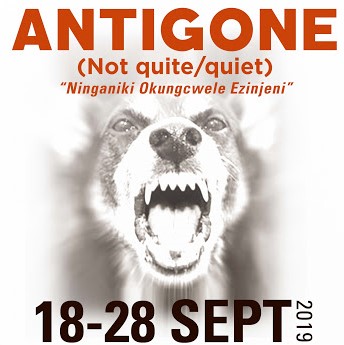
Antigone (not quite/quiet)
Exploring the concept of “tragedy”, it is the first production of an exciting five-year research project on Re-imagining Tragedy from Africa and the Global South (RETAGS), which began at the beginning of 2019, led by Fleishman and Mandla Mbothwe, and funded by the Andrew W. Mellon Foundation. This hard-hitting new work, subtitled Nanganiki Okungcwele Ezinjeni (isiXhosa for “Give not unto dogs sacred things”), explores the nature of protest and responses to power, untangling South Africa’s current tragic reality. Not a production of Antigone, but rather a series of responses to the original play, it is created in three parts – exposing the impossibility of escaping the country’s colonial history; giving voice to the youth to protest against the authority of the state that acts to silence them; and the complicity of the those in power that brought South Africa to this tragic point. -

MA Final Project | Fragments of Encounters
FRAGMENTS OF ENCOUNTERS is an experimental interactive performance project operating within a 'practice as research' (PaR) paradigm-defined as a continually emergent and open-ended process. The participation and interaction of the audience and the feedback received from lecturers and fellow students were central to the development of this research and are integrated in my work. Description of this feedback and its impact will be visible throughout this paper. I will be engaging with my research through the lens of two performances, fragments of encounters 1 & 2, which act as embodiments to my research. The work(s) is a narrative about lives relieved through memory and whose re-narration gives rise to a new present time-that of the narrative, which is the performance. The subject of my research is fragment(ation) seen through the prism of memory, however, not as a main subject but close to Henri Bergson's shining points, round which other subjects 'form a vague nebulosity' (2002:171). The making of this project began in the street; from my interaction with people of different ages and from different socio-political and cultural realities. These encounters make up a personal audio archive of oral interviews recorded, which serves as the source material for my project. The recorded material are life-fragments-memories of the people interviewed and fragments of my own. Overlapping with Herman Parret's (1988) vision, for whom 'life' is a narrative and the narration time is an 'invented' time, the archive I present in my practice is a 'construct', and the re-fragmentation of the fragments of memories in the work opens a field of possibilities of interpretation. Some of these possible reinterpretations are actualised at each re-narration. This in turn opens new interpretations, possibilities or actualisations. By fragmentation and re-narration a mosaic of fragments-memories originate, which are in effect re-narratives... ad infinitum. In the same time, the possibilities that remained unactualised, not narrated, but which are virtual real, amplify the state of tension and uncertainty provoked by fragmentation, which in the end can lead to chaos. -

Acting for Camera 2019
Titled "Some zones of discomfort". -

Walk 2019
Walk is a performance piece created in response to Indian artist Maya Krishna Rao's The Walk. Rao crafted The Walk after the rape and murder of Jyoti Singh Pandey, a 23-year-old student who was tortured, raped and killed by 6 men on a Delhi bus in December 2012. A few months later, we decided, with Rao's permission, to create our own version of Walk as a response to the gang-rape and murder of Anene Booysen, a South African teenager, in 2013. The unimaginably horrific assault and deaths of these two womxn was a catalyst to create Walk as a way to honour their memories and to talk honestly about rape culture. The process of making Walk allowed for the emergence of a series of performed installations, which involve the audience and the performers walking through the pieces together. Although in both South Africa and India there were similarities in public reaction to Jyoti and Anene’s cases, India’s civil response seemed of much greater magnitude compared to South Africa. Despite South Africa celebrating 20 plus years of democracy, coupled with a constitution that is a shining example to other countries, violence against people who identify as womxn and gender non-conforming is still prevalent. One ponders whether, as a nation, South Africans have become numb to the violence imposed on womxn and trans people on a daily basis. Have we gone so far as to normalise it? These question urge us as performance-makers to create work that stirs, that questions, that galvanizes people into action. Our vision for Walk is centred around a sparse aesthetic that foregrounds the figure of the womxn. Its focus is very much on the seven performers and considering the unavoidable, physical fact of their bodies – a fact which we understand rape culture to seek to obfuscate or erase. Walk has performed at various venues and festivals around the world including the GIPCA Live Art Festival, Cape Town 2014; DFL Sex Actually Festival, Johannesburg 2014; Cape Town Fringe Festival 2014; The International Women’s Playwrights’ Conference, Cape Town 2015; Freedom and Focus Conference and Festival, Dublin 2016; Vifa Festival, India 2016; the International Festival of Kerala, India 2018; The National Arts Festival, Makhanda 2018; and the DFL Transforming Arts / Transforming Lives Conference and Festival, Johannesburg 2018. -

P4 Adaptation Project 2019
The annual P4 Theatre making adaptation project, whereby the 4th year theatre making students are asked to adapt a South African short story, and undergoing an exploration in shifting the medium of the written word into the physical and visual theatrical space. -
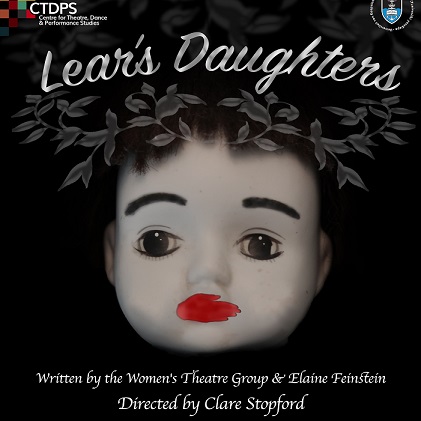
Lear's Daughters
In the tragedy of King Lear, his older daughters are two of the most diabolical female characters in the Shakespeare canon, while the youngest daughter Cordelia, is one of the most truthful and steadfast. Lear’s Daughters, a play created in 1987 by the Women’s Theatre Group (UK), imagines Goneril, Regan and Cordelia as young girls with potential for becoming women of creativity and substance. But locked up in a nursery under the care of a nurse and sometimes nanny, with little but her stories and fantasies of their father’s benevolence to sustain them, the girls flounder. Lear’s Daughters asks ‘what if the alpha male King Lear is all – powerful, his ego a prison, outside of which his daughters may not venture; that these energetic and imaginative young lives, kept in the shadow of their father’s desires and whims, deprived of light and nurture, twist into knotted characters we meet in Shakespeare’s King Lear?’ Yet the play does not set out to join the psychological dots between the deprivations of the sisters’ youth and their evil ways as adults but rather attempts a stand-alone story, complete in itself, with a focus on the broader, topical theme of young women striving for their personal identities under a strict patriarchy. What resources do they have for this battle? Should they internalize shame and infantilization or strike back with the weapons of their father and master? Do they have alternatives and what are they? Lear’s Daughters is a feminist fantasy which imagines a time before Goneril and Regan were the toxic antagonists of their father and king and Cordelia was his forgiving and stalwart warrior-protector. Manipulated by a child-like, self-interested, Shakespearean ‘fool’, and an ambiguously caring ‘nanny’, the play emerges as an Eldritch-like fable of gothic intrigue and extravagance with a contemporary twist. Cast: Cordelia - Tyra Abt See Regan - Jade Butcher Goneril - Kylie Fisher Nurse/Nanny - Frances Sholto-Douglas Fool - Celeste Loots / Kaylee McIlroy -
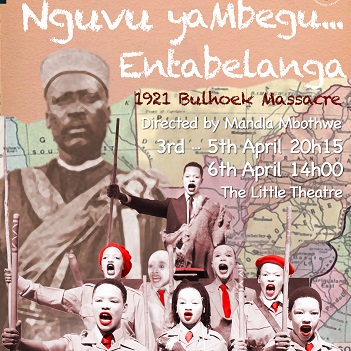
Nguvu yaMbegu… Entabelanga 2019
“History works through people and we have availed ourselves for histories to work through us”. Steve Biko At the heart of the story of the ‘Bulhoek Massacre’ eNtabelanga, is an old story of land and religious dispute between black African people and the white colonisers. It is the demand of Enoch Mgijima, the African Itola and Isanusi, to remember and practice independent and self-sustaining life, free from colonial laws, on land that unjust officials had taken from the AmaXhosa people. This followed the defeat of the Amaxhosa during the wars of dispossession between 1779 and 1878, the Nongqawuse cattle killing of 1856 and1857, the formation of the Union in 1910, and the land act of 1913. In one of his visions, Mgijima saw the first world war to come that ultimately resulted in the sinking of the SS Mendi in 1917 and the loss of so many African lives. The tragic story of what is known as the Bulhoek Massacre, which took place eNtabelanga near Komani (Queenstown) in 1921, when 193 people were shot dead because they refused to leave the mountain of prayer that they lived on, is one of South Africa’s, and specifically the Eastern Cape’s, most notorious colonial crimes. Nguvu yaMbegu...eNtabelanga is a Swahili title meaning the power of the seed. It claims the resistance and the resilience of memory. The performance seeks to resist and revolt against certain dominant aspects of our lives that preserve the continued erasure of black identities. It is an attempt to water the long-buried seed by walking through the past. It is performed by eight final year students in the Centre for Theatre, Dance and Performance Studies at UCT who also played a role in creating the work. -
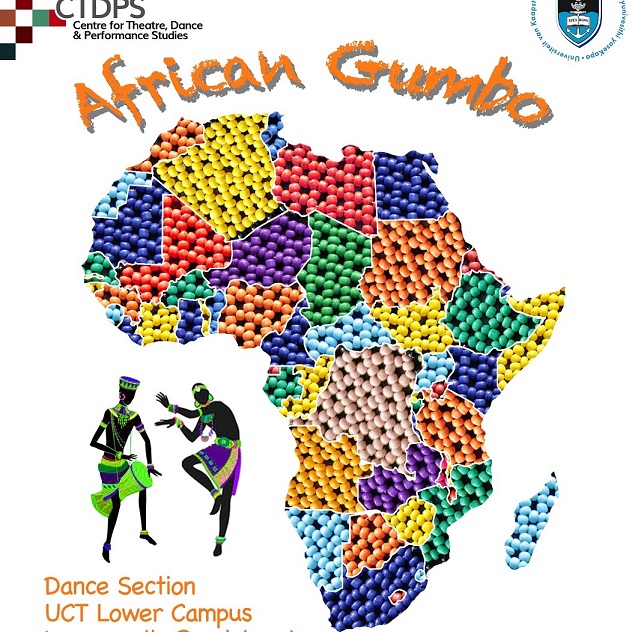
African Gumbo 2019
African Gumbo is about celebrating Africa as a continent and its dynamic influences in the modern world through African and African Diaspora dances staged with 21st century interpretations. The month of May is celebrated across Africa as Africa month and it is an important event in the history of Africa. The 25th of May signifies the rejection of colonial and imperial domination in the continent. African Gumbo explores materials of decolonisation by focusing on telling Africa’s stories which are written by themselves and owned by themselves democratically. This means ‘writing back’ against the ongoing colonialism and colonial mentalities that permeate our ways of being, education, media, government policies, and ‘common sense’. African Gumbo celebrates such a cause, through dance, African music, African cuisine and scholarly discussions in a resistive Nubian way. African Gumbo is about transformation in our African dance artform and to create a platform for decolonial act. The work that is covered in this 2019 Gumbo commemorate Wom(e)n and their hardship they experience in the modern 21st century Africa and its gender challenges. -
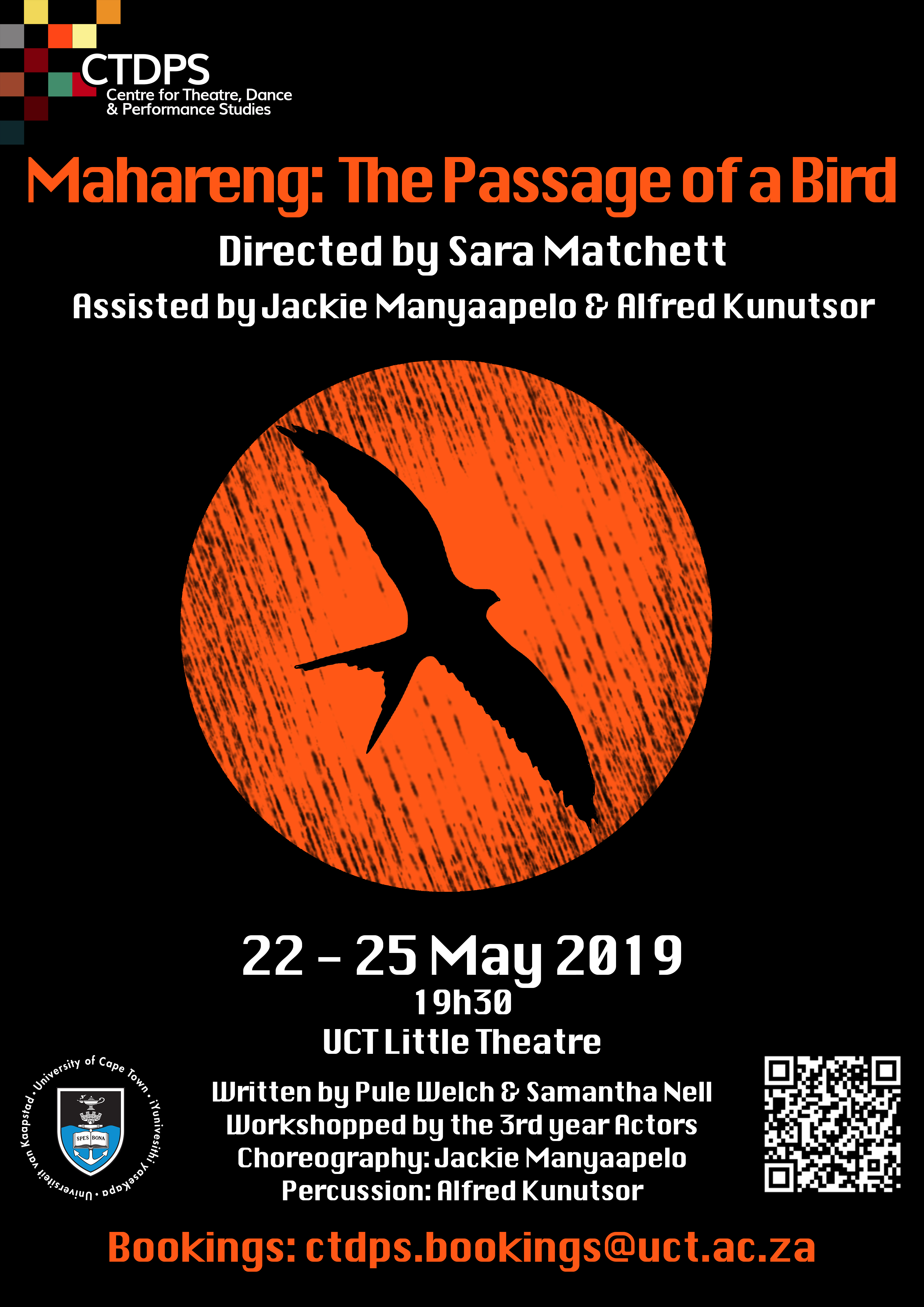
Mahareng: Passage of the Bird
Mahareng: The Passage of a Bird, based on a myth by Pule Welch and Samantha Nell, has been collaboratively made by the CTDPS 3rd year Acting students. The production considers migration and its associated challenges through tracing the passage of a bird that was born to a human King and Queen. The bird is forced to take on human qualities. When the nation realise that the boy-child is in fact a bird, they cast the King, Queen and their bird-child out. Their only hope is for their child to remember how to fly. They take him into the Land of the Dead to drink from the River of Remembrance. He remembers how to fly and carves a path of stars through the sky for his parents to follow. However, after the King, Queen and Bird have been cast out, power struggles over who should lead the nation erupt, resulting in civil war. The land burns and everyone is forced to flee. Their only hope is to follow the path of stars carved by the bird in the sky. The production traces the many trials and tribulations they must face on this journey to ‘freedom’. Various sites on Hiddingh Campus are being utilised. The audience will journey from site to site. -

Intando Yam: My Choice
Intando Yam: My Choice was the Sex Worker Theatre Group SA’s first production that formed part of the four-year GlobalGrace (Global Gender and Cultures of Equality) research project that investigates the variety of ways that equalities are made and contested in different parts of the world and how people’s creative practices challenge inequality and engender new possibilities for more equitable ways of living together. The project comprised five work packages from around the world that employed arts-based practices and multi-sensory research to investigate the production of cultures of equality and enable gender-positive approaches to well-being internationally. The South African work package engaged collaboration between the CTDPS, the AGI (African. Gender Institute) and SWEAT (Sex Workers Education and Advocacy Taskforce) and involved training sex workers in various theatre and performance practices. The training was divided into five clusters, four culminating in a performance. Intando Yam: My Choice was the culmination of training in participatory theatre methodologies. -
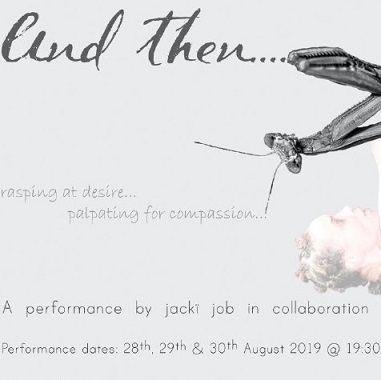
And then... 2019
“And then…” is all about desire that lies beneath the surface and thus, often kept secret. Desire vibrates, agitates and encounters what seems strange and different to convention. This production awakens and reveals what is secret and takes audiences on an insatiable journey of yearning. And then… uncovers salacious appetites, cravings, and wants of something or someone that is not immediately available and remains out of reach. “And then…” will fluster and inflame, tug at the heart and expand how we imagine and play ourselves in everyday life. -

Live, Love and Leave a Legacy
In keeping with Heritage Month, which South Africa celebrates in September each year, Live, Love and Leave a Legacy challenged audiences to think about their historical inheritance and the legacy they would like to leave behind for future generations. In addition, a symposium included Andy Watson, from UK’s Geese Theatre Company, who presented a lecture-performance of the company’s famous interactive mask theatre work, and Professor Leon Holtzhausen and Venessa Padayachee presented papers on criminal justice and restorative justice. Two performance items are presented by a company of parolees and University of Cape Town students, and the other by a group of offenders from Pollsmoor Corrections Centre. The script for the Pollsmoor production was collectively made by the following performers and facilitators: Fadwah Carelse, Blanks, Bongani Rasta, Cornell Bouwer, Demi, Faatigaah, Jabu, Jodene Cyster, Kwasta, Mimi, Romano Sampson, Sakeenah, Sinethemba Mshudulu, Snow, Thimno and Veronica Baxter. The script and performance for the parolee production was collectively devised by the following performers, students and facilitators: Bongani Dyalivana; Boxer Biyana; Matthew Bennett; Merlin Lameyer; Tracey- Jean Geland; Zikhona Madlalisa; Maggi Fernando; Abigail Williams; Gabriella du Toit; Juliette Rose-Innes; Kayla Dunne; Lernice Parker and Lonwabo Notana. -
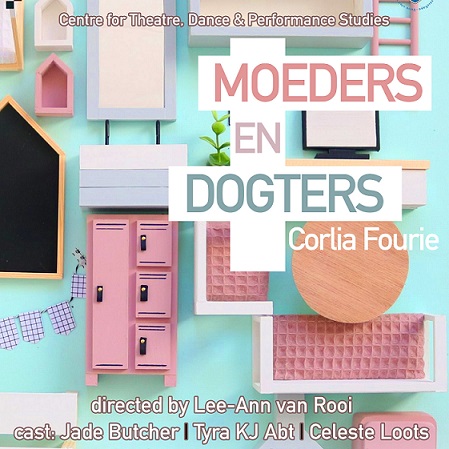
Moeders en Dogters
The play: The award-winning family drama, Moeders en Dogters, was first published in 1983 and first staged in 1985. Set against the political instability of the 1976 Soweto student uprising, the play examines the lives of three daughters, their mother and domestic worker. The production: Reimagined for the bilingual Afrikaans 4th year students at CTDPS, with permission from the playwright, Corlia Fourie, we have held onto the drama, let go of the realism somewhat... and set it in present day, October 2019. The story: The sudden death of the father, a well-known artist, Gert Cilliers - Smit, gathers the three sisters under one roof for the first time, in more than 3 years. As the saying goes... You can choose your friends, but you can't choose your family. Cast: Anna, Eldest - Jade Butcher Susan, Middle - Tyra Abt Ma & Gertjie, Youngest - Celeste Loots -
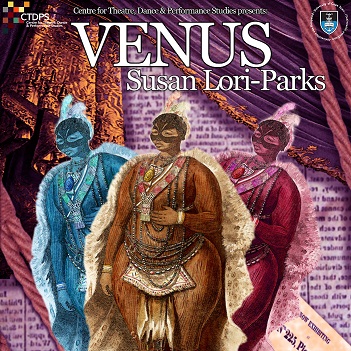
Venus
Susan-Lori Parks' Venus is a spectacle of the senses, an act of transgressing prescribed theatrical modes and interrogating the paradoxes of being. We follow the archival life of Sara Baartman/The Venus Hottentot through the interrogation of the Negro Resurrectionist/s and uncover moments patched together like an ill-fitting quilt upon the senses. This interpretation of the play at UCT's Centre for Theatre Dance and Performance Studies is presented by 4th yr acting students: Zizo Solontsi, Katlego Mhlongo, Lungile Lallie, Luhle Macanda, Kylie Fisher, Mamello Makhetha, Anathi Rubela, Kaylee McIlroy, Luthabo Maduna and Lwanele Nqambi under the direction of Warona Seane. The play is but a fictional presentation drawn from the myriad archives that exist, around the life of Sara Baartman in Europe. Parks mentions that it is meant to be a show, a spectacle of remembrance and re-membering, a transgression and subversion of any supposed modes possibly prescribed by the ever-increasing isms we are allegedly governed by. Cast: Venus / The Girl / Saartjie - Zizo Solontsi Baron Docteur - Lungile Lallie The Mother Showman / The Grad-School Chum - Katlego Mhlongo The Negro Resurrectionist(s) - Luhle Macanda & Kylie Fisher The Man - Anathi Rubela The Man's Brother - Kaylee McIlroy Chorus of Freaks / Spectatots / Court / Anatomists - Lwanele Nqambi, Mamello Makhetha, Luthabo Maduna, Kaylie McIlroy, Anathi Rubela The Father - Lwanele Nqambi The Mother - Mamello Makhetha The Bride-To-Be - Kylie Fisher The Young Man - Luthabo Maduna The Uncle - Kaylie McIlroy -
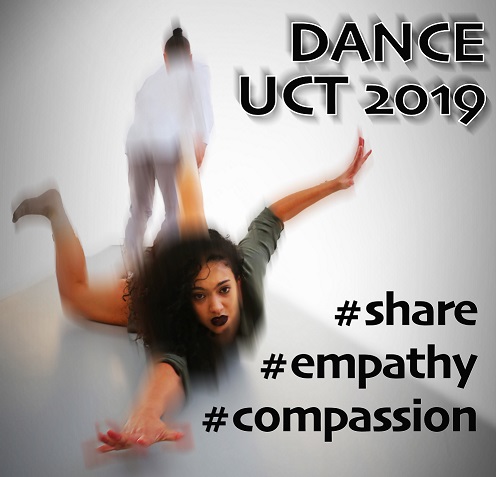
Dance UCT 2019
The impulse for naming what has become our Dance UCT 2019 #share#empathy#compassion programme: a compilation of ‘performance examinations’ is this year undoubtedly rooted in the national concerns of gender-based violence and xenophobia. These social mores have plagued our country and the global community and need our collective response. This proudly contemporary African dance programme features award-winning choreographers including Brigitte Reeve, Celeste Botha, Louise Coetzer, Shaun Oelf, Maxwell Rani, Janine Booysens, Elvis Sibeko and Zakhele Nkosi. Whilst the central concern for many South African artists continues to be issues of gender-based violence this poignant programme also offers glimmers of hope. The array of dance works promises to reflect the range of dance vocabularies and the student body: from young first year students to final year of study students eager to enter the professional performing arts industry. Director of the production Dr Gerard M. Samuel was chatting to the ‘two Vuyokasi’s’, V. Peter reflected, ‘it’s a great honour to show the public what I’m capable of and how I’ve benefited from the course” to which V. Vusani exclaimed, “Yes! To see where we are now…and were then”. Samuel noted, “The programme forms part of the overall assessment of these dancers and is an opportunity to push boundaries artistically and most importantly to tear down prejudice and discrimination”. Zakhele Nkosi pays tribute to Uyinene Mrtwetyana, Maxwell Rani tackles the scourge that is xenophobia whist Reeve, Botha and others explore unity and camaraderie. The matinee performance will not feature Say something, do something by Booysens due to the sensitive nature and nudity in this provocative work. -

Yeki Hambe: Let it Go
Yeki Hambe: Let it Go was the Sex Worker Theatre Group SA’s second production that formed part of the four-year GlobalGrace (Global Gender and Cultures of Equality) research project that investigates the variety of ways that equalities are made and contested in different parts of the world and how people’s creative practices challenge inequality and engender new possibilities for more equitable ways of living together. The project comprised five work packages from around the world that employed arts-based practices and multi-sensory research to investigate the production of cultures of equality and enable gender-positive approaches to well-being internationally. The South African work package engaged collaboration between the CTDPS, the AGI (African. Gender Institute) and SWEAT (Sex Workers Education and Advocacy Taskforce) and involved training sex workers in various theatre and performance practices. The training was divided into five clusters, four culminating in a performance. Yeki Hambe: Let it Go was the culmination of training in Physical Theatre methodologies.
2018
-
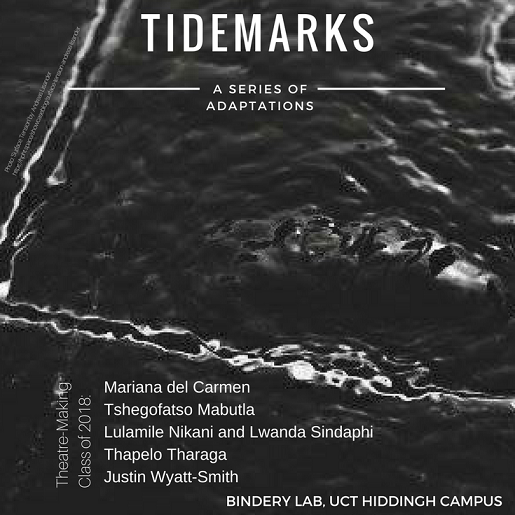
P4 Adaptation Project | Tidemarks
Life comes to us in the same way the ocean approaches its shore. What is brought with it, and what is taken away again, often lies with forces larger than us. So what remains after? After a love, a loss or a fatal choice? What remains? The tidemark left behind is a constant reminder that separates the before from the after. The imprint remaining; an invisible scar or a deeply treasured memory. Are we each other’s tidemarks? Which tidemarks have become our common history, our common burden, our common book of memories? Which tidemarks have shaped and marked us, to who we have become? Tidemarks is a series of adaptations presented as part of the 4th year Theatremaking students program. Starting with a South African short story, the theatremakers undergo a 5 week exploration in discovering how to shift the medium of the written word into the physical and visual theatrical space. -
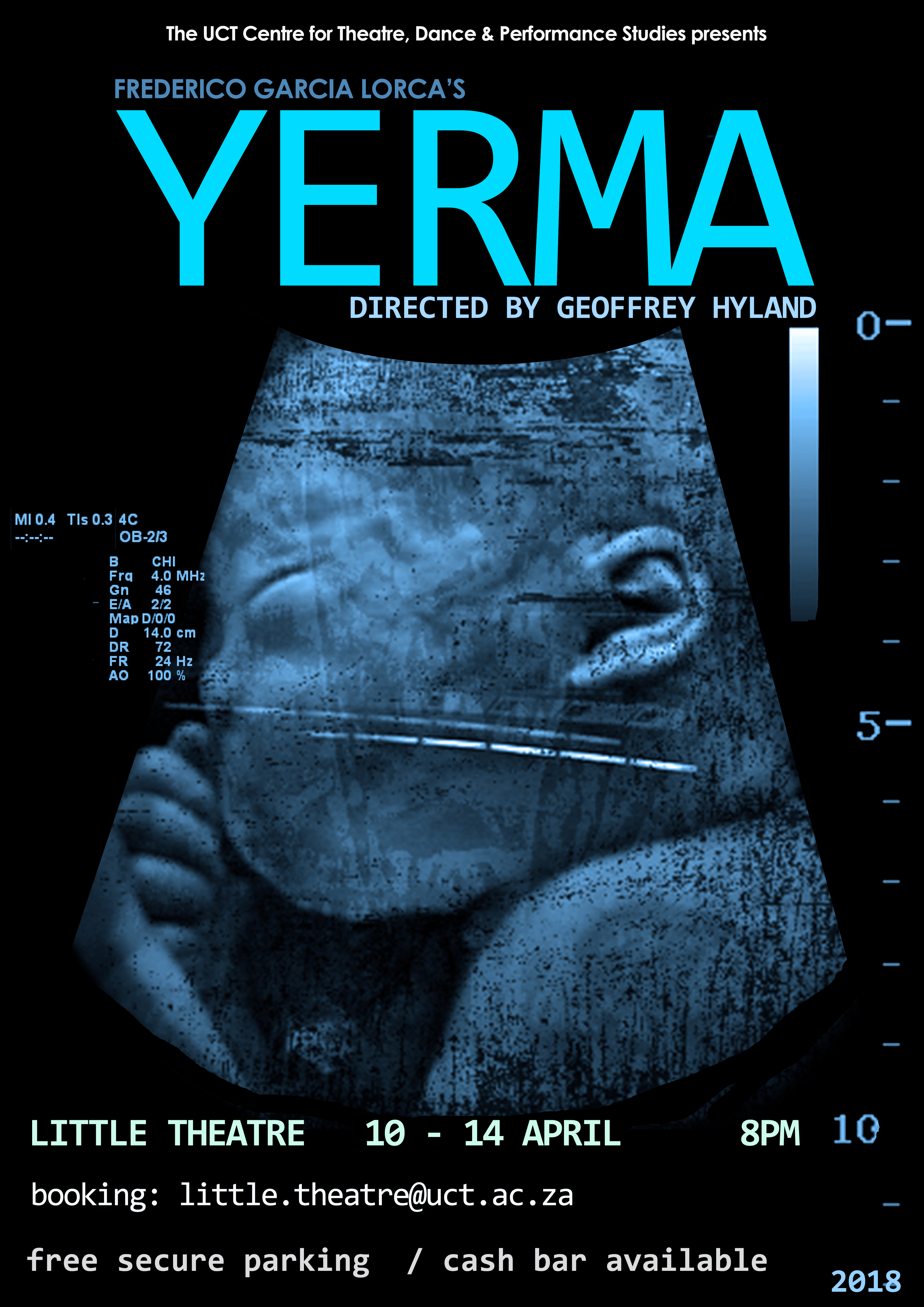
Yerma: A Tragic Poem in 6 Acts
“I need a glass of water and I have neither glass nor water.” Through this simple image, Federico Garcia Lorca captures the yearning central to his play, Yerma. Certainly, it is an image to which we can relate in our drought-stricken part of the country. Yerma (meaning 'Barren') is one of three tragic plays that make up Lorca's 'rural trilogy'. It is possibly Lorca's harshest play, following a woman's extraordinary struggle for motherhood. Yerma’s barrenness becomes a metaphor for her marriage in a traditional society that denies women sexual and social equality. Her desperate desire for her body’s unfulfilled purpose becomes an increasingly destructive obsession which drives her to commit a terrible crime. The play has a simple story-line, charting the mounting anguish of the childless young wife and the reactions of those around her. For the passionate Yerma, maternity is the consuming purpose of her life, yet she is irrevocably committed to her marriage as the only honourable means to fulfilling it. Troubled by a sense of something wrong in her relationship with her husband (the hard-working, emotionally withdrawn Juan) she nevertheless refuses to acknowledge her enduring attraction to Víctor, a local shepherd. Her restless behaviour makes her the object of local gossip and her husband’s resentment and vigilance. Yerma’s drive towards self-realisation, an all-consuming thirst that she cannot name or hold, clashes with the strict, oppressive moral codes of the society she is born into. Written in 1934 by the much celebrated Spanish writer Federico García Lorca, the play is a poetic blend of contrasting moods through which Lorca probes the darker zones of human fears and desires. The play's rich mode of expression - infused with poetic imagery, song and movement - also celebrates natural instinct, sexual attraction, fertility, creation and procreation. This production is presented by the newly formed UCT Centre for Theatre, Dance & Performance Studies. Geoffrey Hyland, assisted by Puleng Stewart, directs the 4th year Acting Studio. Choreography is by Jared Musiker and Godfrey Johnson composes music for Lorca’s poetry. Set Design is by Jenni-Lee Crewe with Nicolas Mayer; Costume Design by Leigh Bishop. Hyland has long been drawn to Lorca’s enigmatic poetic works and has directed 2 productions each of Blood Wedding and The House of Bernarda Alba. Collaborating with La Rosa Spanish Dance Company, Hyland adapted both these plays to dance works as well. Cast: Yerma - Cassandra Mapanda Juan - Fadzai Simango/ Mphumzi Nontshinga Juan's Sisters - Adam Lennox/ Tevin Musara Maria - Sesanye Sealy Victor - Thukelo Maka/ Caleb Swanepoel Pagan Woman - Megan Theron Dolores - Noxolo Blandile Conchita - Bianca Oosthuizen Luisa - Sibonokuhle Mensah Pilar - Kim Adonis Rosaria - Michaela Moses Nuria - Kelly Jeffery Juanita - Sispesihle Mnganga -

Womb of Fire 2018
Winners of three awards at the 2018 Stellenbosch University Woordfees in the categories for Best Play, Best Director and Best Performer, winners of two 2019 Fleur du Cap awards in the categories for Best Performance in a Revue, Cabaret or One-person Show, and Best Sound Design, Original Music Composition or Original Score, and winner of the 2018 UCT Creative Works Award, Womb of Fire has gained acclaim since its premier at the National Arts Festival in Grahamstown in 2017. Thereafter it performed at: the ICA’s 2017 3rd Space Symposium; the University of Johannesburg Con Cowan Theatre (2017); the International Theatre Festival of Kerala, India (2018); Woordfees Festival, Stellenbosch (2018); the Baxter Theatre (2018); Pan African Creative Exchange (PACE), Bloemfontein (2018); and the Afrovibes Festival, The Netherlands (2018). Womb of Fire was conceptualised by Sara Matchett and Rehane Abrahams, co-founders of The Mothertongue Project, a women’s arts collective with a 23-year history of engaging integrated arts methodologies to activate personal and social transformation. In 2000, Rehane and Sara created works like What the Water Gave Me (the production that birthed The Mothertongue Project). Set against an episode from the Indian epic, The Mahabharata, the play interweaves personal narrative and contemporary realities with the lives of two women from the founding years of the Cape Colony to interrogate the Womb of Fire that birthed South Africa. The play follows Grote Katrijn van Pulicat’s (1681-1683) journey across India to Batavia and then to Cape Town as the first female bandit slave; it then explores the briefly brutal life of Zara (1648-1671), a Khoekhoen servant woman who was violently punished posthumously by the VOC for the crime of suicide. Womb of Fire looks at the power of the performing female body to challenge the pornography of Empire, in the process decolonising and retrieving itself. The play reaches back and forward across time to reassemble the dismembered body, allowing it to speak. This production has seen multiple tours to: the National Arts Festival in Grahamstown (2017); the ICA’s 2017 3rd Space Symposium; the University of Johannesburg Con Cowan Theatre (2017); the International Theatre Festival of Kerala, India (2018); Woordfees Festival, Stellenbosch (2018); the Baxter Theatre (2018); Pan African Creative Exchange (PACE), Bloemfontein (2018); The South African Women's Arts Festival (2018)and the Afrovibes Festival, The Netherlands (2018). -
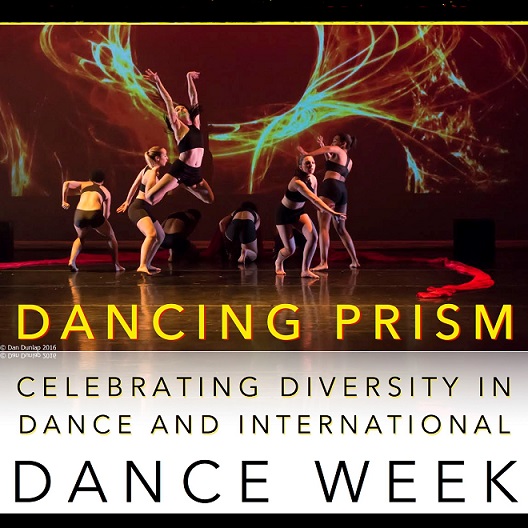
Dancing Prism
Dancing Prism is a celebration of DANCE. In honour of International Dance Day 2018, we celebrate: dance that refracts diversity and inclusivity; dances of the privileged and dances of the forgotten; DANCES OF THE FEET, HANDS, EYES and HIPS, grounded in centuries f rhythmic beats and histories. Dance is an antidote to our madness, an embodied state of being that houses our genealogies, stories, desires, fantasies and our spiritualities. To dance is an expression of our humanity. Dancing Prism is a journey through time and place to illuminate the global beauty and poetic mysteries of DANCE, one of the oldest forms of expression gifted to mankind. -
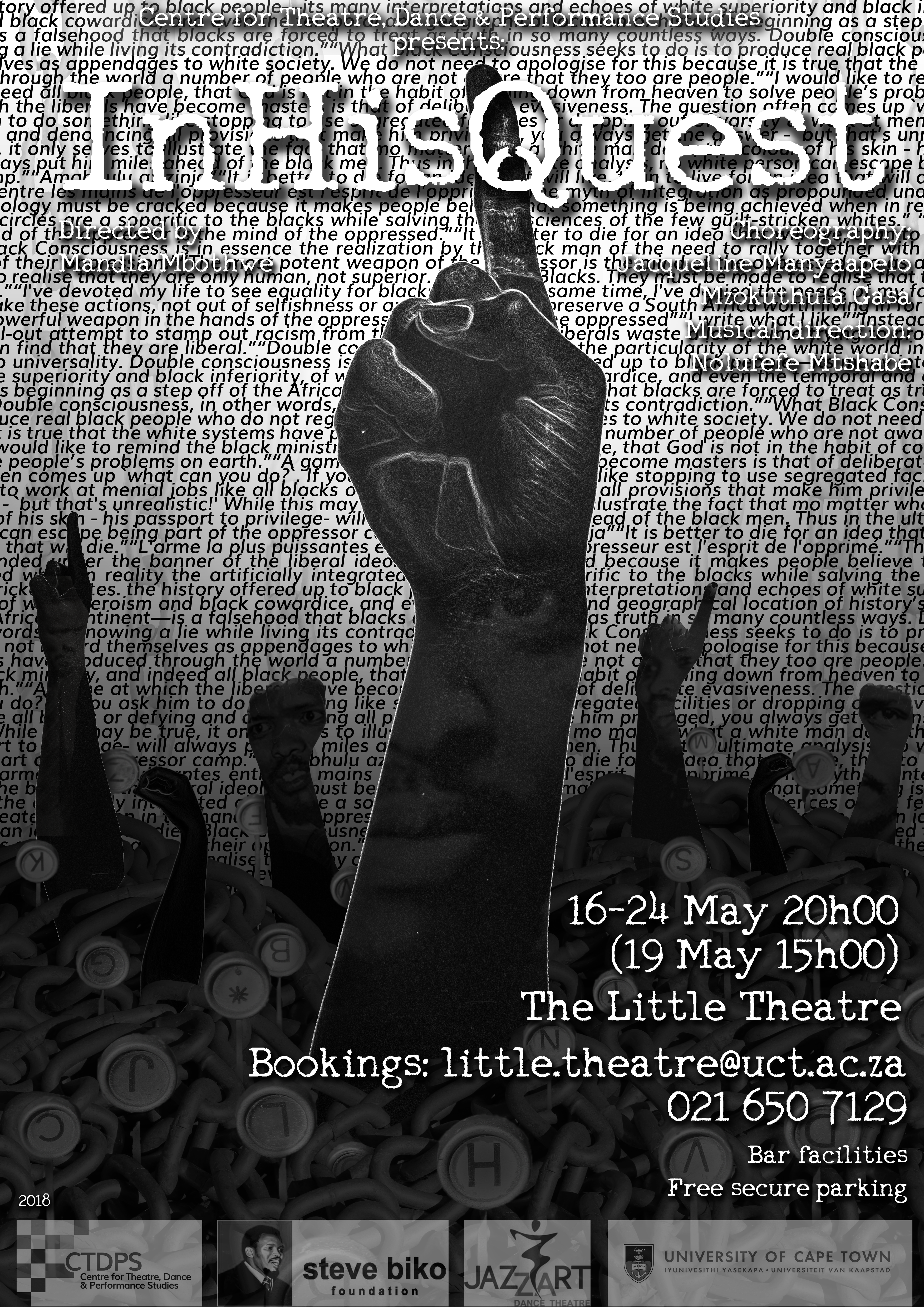
In His Quest
Umqolu’velile. Ubuqhophololo bengqiqo zasentshona bubentsile! For many generations, black people lifted up their hands so high in providing Ubuntu led civilized progressions, that one day they were made to believe that those hands, those ideas, were demonic, uncivilized and negatively primitive. Izihlwele zihleli!, qonqozani siqabele iqegu sokuqhawula amaqhina enkohlakalo engqondo. A time came when they again gained the confidence to lift their hands once more in their life, but still they were ignored and were again made to disappear from view. They were buried, but little did they know that they were Nguvu yaMbegu, “the power of the seed”. The hands grew back up in multiples. That is the magic of towering people, when they are not buried, they are planted and, like seeds, they come back up multiplied. Directed by Mandla Mbothwe and featuring the talents of both senior dance and theatre students from the recently merged Centre for Theatre, Dance & Performance Studies, “In His Quest” embodies a continuation of the pursuit for meaning in Steve Bantu Biko’s statement and mission towards a “Society with a more Human Face”. Obu bubuntu bukaBantu Biko. By combining the creative genius of choreographers Jackie Manyaapelo and Mzokuthula Gasa with musical direction by Nolufefe Mtshabe, “In His Quest” emerges with fresh, energetic representations of Biko’s words and quest. Added to the live performance is a tapestry of video graphics, masterfully crafted by Sanjin Muftic, that intertwine with Elvis Sibeko’s gripping soundscape and Bamanye Yeko’s seamless lighting design. A visual and sensory exploration of thoughts and ideals through dreamlike imagery, merging multimedia, dance and performance to create a modern telling of an age-old struggle for identity, consciousness and dignity. De siqabuke kumaqhinga, siqule sijojile, de sityeleni sithebeni sinye! -

A Lie of the Mind
In their final graduating production, the CTDPS presents the 4th Year Actors directed by Geoffrey Hyland in Sam Shepard’s award-winning play, “A Lie of The Mind”. Hailed as Shepard’s richest and most penetrating play, ‘A Lie of The Mind’ explores family dysfunction and the nature of love set against the backdrop of the gritty America West. The story alternates between two families in the wake of a severe and life-altering incident of domestic abuse. Through the play Shepard creates an alternately amusing and haunting portrait of displaced and irreparably damaged people, of broken connections, and of chronic lapses of memory. When the mind can take no more, it clings to old-fashioned beliefs and comforting rituals…or it survives by breaking down and rewiring its pathways. ‘’A Lie of The Mind is a mesmerising, emotionally raw play that once again pulls the view into Shepard’s distinctive world of disturbed reality and hungry hearts.” – Variety. -
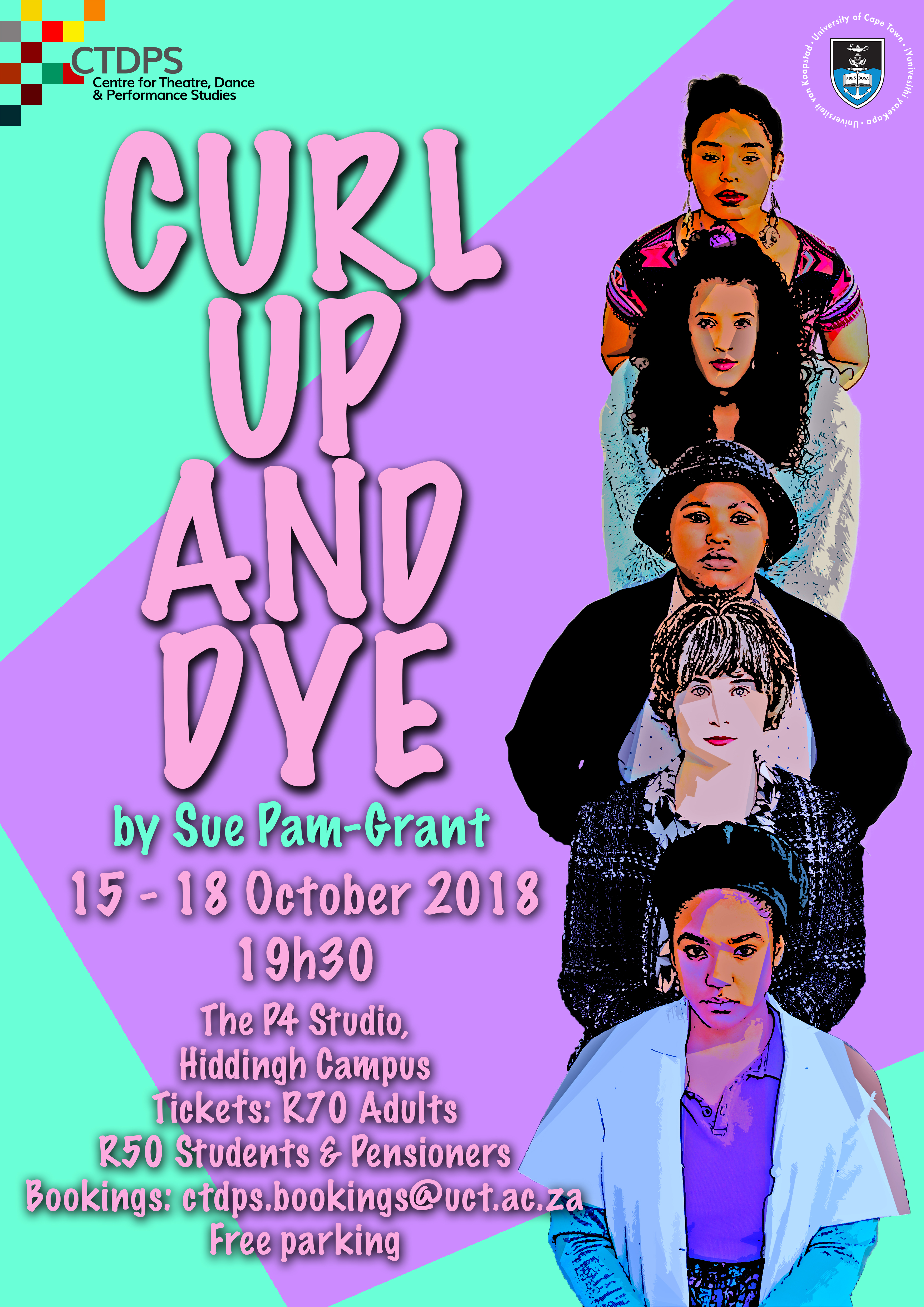
Curl Up and Dye
In their final graduating production, the CTDPS presents the 4th Year Actors directed by Anthea Thompson in Sue Pam Grant’s award-winning play, “Curl Up & Dye”. Set in a dismal hair salon in a dreadful Johannesburg slum, one experiences the toing and froing of the dreary and inevitable power games which poor blacks and whites have to play. This is a world where life is cheap and pride is hard to hold onto. The play has seen numerous revivals over the years and was re-written in 2013. This is the first Afrikaans translation of the play. Cast: Miriam – Kim Adonis Dudu – Noxolo Blandile Mrs Dubois – Megan Theron Rolene – Kelly Jeffery Charmaine – Michaela Moses -
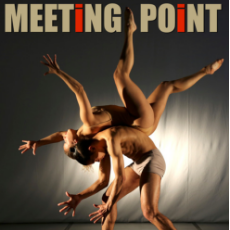
Dance UCT 2018
The Centre for Theatre, Dance and Performance Studies (CTDPS) is delighted to bring you Meeting Point: “sinuous kinetic conversations among bodies and communities in motion with time, space and rhythmic energies” (Lisa Wilson, Artistic Director) in two Acts. DANCE in the Centre focuses on contemporary dance performance through multiple artistic lens and continues to be a meeting point of past, present and future dance currents. Act I features our students performing newly created dance works and repertory learnt in their African, contemporary, and classical technique courses with CTDPS dance faculty: Maxwell Xolani Rani; Byron Klassen; Janine Booysens; Nicolette Loxton and Lindy Raizenberg. Some of the new works such as ‘Contact’ premiered at the 2018 Baxter Dance Festival in Cape Town. Act II features the commissioned work 'Point of Connection' by acclaimed choreographer and Artistic Director Sifiso Kweyama of Jazzart Dance Theatre, with assistance from the Jazzart dancers. 'Point of Connection' interrogates the influence and dynamics of an individual’s internal connection to others, the ebb and flow of human connection. CTDPS is delighted to have partnered with Jazzart in generating this beautiful and challenging work for our dance students. The work premiers here at the Little Theatre and will later be presented at Artscape for the 2018 Jazzart Dance season. This season's performance forms part of our students’ course examinations. Thank you for your support over the years in the development of our dancers as performers, teachers, choreographers and researchers. Meeting point showcases our students moving fluidly in and through these embodied identities and across multiple physical languages. -

MA Final Project | Seriti
-
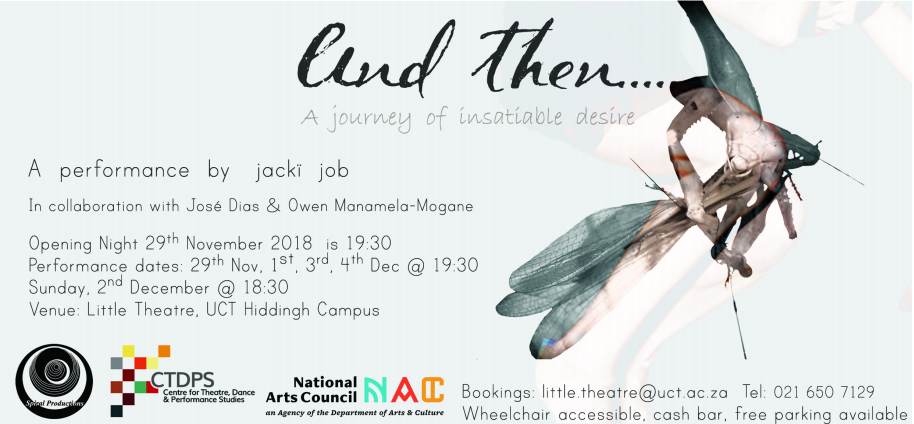
And then... 2018
jackï job of Spiral Productions in collaboration with The UCT Centre for Theatre, Dance & Performance Studies brings to you the production of “And then…” “And then…” is all about desire that lies beneath the surface and thus, often kept secret. Desire vibrates, agitates and encounters what seems strange and different to convention. This production awakens and reveals what is secret and takes audiences on an insatiable journey of yearning. And then… uncovers salacious appetites, cravings, and wants of something or someone that is not immediately available and remains out of reach. “And then…” is an original new work conceived, directed and performed in the signature innovative dance language of Jacki Job in close collaboration with pianist, José Dias and performer, Owen Manamela-Mogane. The nuanced stratums of desire are also evoked in the costumes, set and light designs, giving this production an “other-worldly”, immersive atmosphere. “And then…” will fluster and inflame, tug at the heart and expand how we imagine and play ourselves in everyday life. -

MA Final Project | Beyond the Wall
This study employs Jean-Paul Sartre’s theories of the ‘analogon’ and the imaging consciousness to develop the relationship between body and object in mask performance. It proposes that the analogon has the ability to pull the audience’s consciousness into a space that lies between the real and the fantastical, a space that can be defined as the imaginary. This production extends the relationship between bodies and non-bodies in mask performance, and uses this as a means of generating metaphorical images in order to make the imaginary world come alive in the audience’s imaging consciousness. Beyond The Wall aims to unearth the war over the reclaiming and salvaging of land between Israel and Palestine enunciating the West’s influence in the formation of the Gaza strip. The production makes use of physical theatre, masks, object manipulation, sound and set design to tell the story.


